#something about women being relegated to the kitchen
Explore tagged Tumblr posts
Text

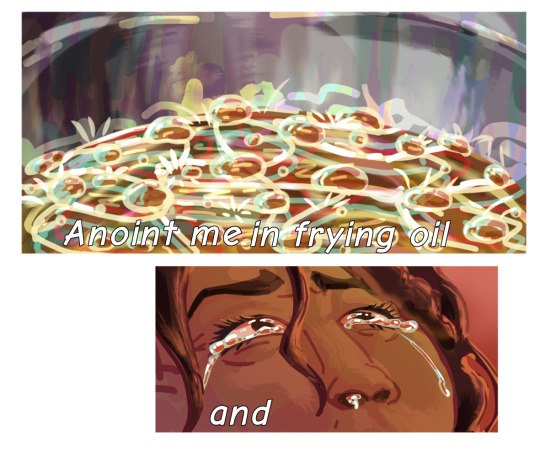
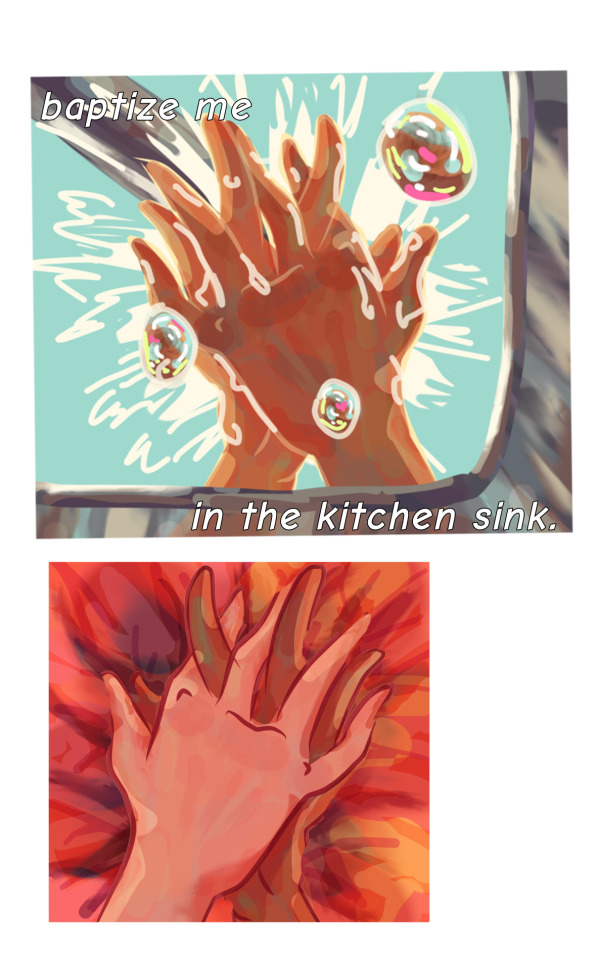
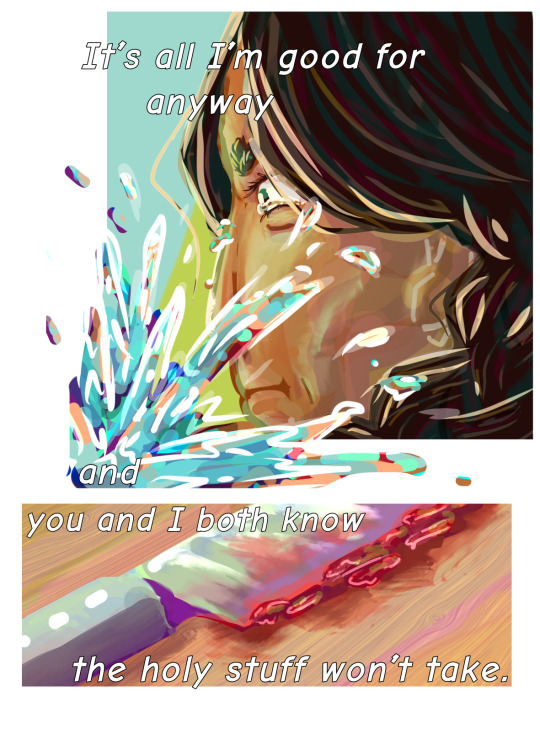
I saw this stupid fucking post screenshotted on Pinterest and inspiration struck me so hard that I immediately stopped studying chemistry and pulled an all nighter to make possibly the best piece of art I’ve ever made I’m so proud of myself and so mad at myself at the same time adhd is a wild ride sometimes anyways
Art inspired by stuff I found on Pinterest part 4
TW: rape, blood, violence
#art#illustration#digital art#digital drawing#ibispaintx#feminism#comics#pinterest#art study#i do not control the hyperfixation#definitely going to use this color scheme again I’m fucking obsessed#religious art#feminist art#something about women being relegated to the kitchen#and losing autonomy over their bodies#and Christianity being a patriarchal religion#where women can never be equal#and are shamed for things beyond their control#and the idea of washing away impurity#and the way your body can feel alien and disgusting no matter how hard you scrub
7 notes
·
View notes
Text
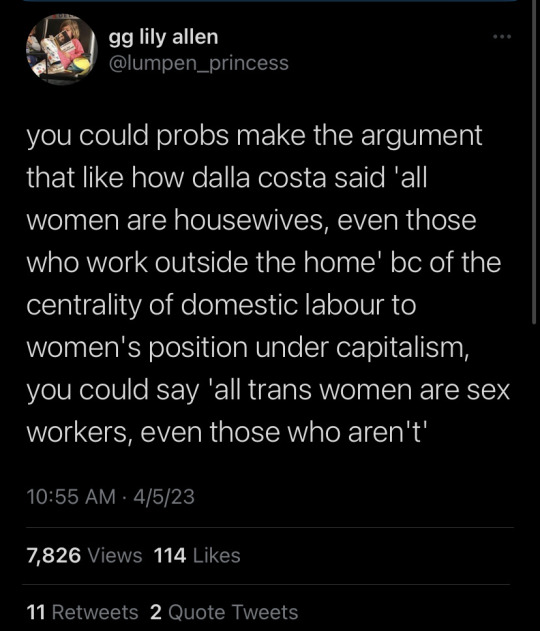
honestly there's a lot to think abt here from legislation targeting trans women (public indecency, solicitation, prurient purposes) to expectations of sexual availability (everything from cis ppl not caring abt consent to GC genital checks) to pressures around presenting in a sexualized or desexualized way--i know a lot of trans women hav trouble navigating this one, bc one wants to feel good about oneself but the moment you dress in a vaguely revealing way its highly sexualized, leading to a whole counter aesthetic of baggy hoodies & flannels & loose pants (an overlap w traumatized cis lesbian aesthetics for sure, but also w sex workers getting off the clock & not wanting to be harassed on the bus ride home).
its hard to discuss this dynamic without erasing or minimizing the further oppression faced by trans women actually engaging in sex work, especially fssw, but it's been something broadly known by most trans women i've talked to about it that we are seen as an identity inherently linked to sex work. for many people the first exposure to trans women is either porn, seeing sex workers on the street, or "dead tranny h**ker" jokes in family guy or whatever. no normie cis person's idea of a trans woman is a virtuous mother, in terms of the madonna/whore complex of patriarchy we are firmly relegated to one side. rather the dynamic is sexual predator / sexual prey, with sexual prey being considered the more virtuous, but both being seen as open for killing.
and in many ways i think it would be fair to see sesta/fosta as the beginning of the legal reaction against trans people in the US. at this point one of the main tactics for controlling trans--and queer in general--content in online and other media is by appealing to its inherently sexual nature. likewise this is used as a justification for all sorts of right-wing amplification of violence, which is very telling given how many right-wing politicians & pundits seek out trans porn & sex workers. just as a man might say "a woman belongs in the kitchen", it's clear a lot of people think "a tranny belongs in the redlight district, and nowhere else!"
4K notes
·
View notes
Note
Y'know, that clip from Family Guy, where Quagmire tells Brian why he hates him, kind of fits Viv. ⬇️ (just gotta change some words here and there)
You are the worst person I know. You constantly hit on your best friend's wife(screw over your friends), the man (they)pays for your food and rescued you from certain death(funded your youtube pilot, worked their butts off to get you where you are now), and this is how you repay him(them)? And to add insult to injury, you(go and talk about Ashley behind her back) defecate all over his yard. And you're such a sponge. You pay for nothing, you always say "Oh, I'll get you later," but later never comes. And what really bothers me, is you pretend you're this deep guy(woman) who loves women(LGBTQ+ people) for their souls when all you do is (relegate your LGBTQ+ characters down to stereotypes) date bimbos. Yeah, (some people make their LGBTQ ocs into stereotypes) I date women for their bodies, but at least (they're)I'm honest about it. (They)I don't buy them a copy of ("Sausage Party") "Catcher in the Rye" and then lecture them with some seventh grade interpretation of how (Seth Rogan) Holden Caulfield is some profound intellectual. He wasn't! He was a spoiled brat! And that's why you like him so much, he's you! God, you're pretentious! And you delude yourself by thinking you're some (savior of indie animation)great writer even though you're terrible. You know, I should've known(Gooseworx) Cheryl Tiegs didn't (draw) write me that (character) note. She would've(understood basic character design principles)known there's no "a" in the word "definite." And I think what I hate most about you is your textbook liberal agenda, how we should "legalize pot, man," how big business is crushing the underclass, how homelessness is the biggest tragedy in America. Well, what have you done to help? I work down at the soup kitchen, (Viv)Brian. Never seen you down there! You wanna help? Grab a ladle! And by the way, (being a well known indie creator)driving a Prius doesn't make you Jesus Christ! Oh, wait! You(probably) don't (know anything about)believe in Jesus Christ or any religion for that matter, because "religion is for idiots!" Well, who the hell are you to talk down to anyone? You failed (to make something good) college twice, which isn't nearly as bad as your failure as a (boss) father! How's (Erin) that son of yours you never see? But you know what? I could forgive all of that, all of it, if you weren't such a (hack) bore! That's the worst of it, (Vivienne)Brian. You're just a (bullying, narcissistic, talentless)big, sad, alcoholic (hack)bore.
File this one under asks that feel like cracking your back, in the best way.
35 notes
·
View notes
Text
A person can worship a goddess and still be a raging misogynist.
I see this all the fucking time, too, and the "b-but I'm pagan!" line does get trotted out.
Yeah, no. I don't care how devoted you (claim you) are to Hecate/Freya/Babalon etc, I care how you treat flesh-and-blood people.
You can't pretend that "worshiping a goddess" makes someone, by default, not a misogynist. I see guys who have a (weird) notion of "divine femininity;" a perfect nurturing caregiver of sorts. They then get irate when a woman won't take that role for them.
They expect a (very narrowly-defined) goddess, and when they don't get one, they get mad. I end up reading their rants online as a bystander. A lot of these guys will claim the woman has somehow betrayed them, isn't pagan enough, or is an evil supernatural being?! Vampire? It's sometimes something like that.
On another note? Many transphobes are also very loud about how they "worship goddesses." They're, of course, equally loud about their disrespect for women, though. There's some "trad pagan" types, too (or whatever they're now called) who believe in goddesses - but also believe that women belong in the kitchen.
So yeah. Don't assume someone's safe and not bigoted simply because they worship Demeter or whoever. Don't let them claim that their goddess patron absolves any shitty behavior. This is a thing that keeps popping up, and I think people should be mindful of it. Don't let people like the above act as if worshiping Minerva, Aphrodite, or Juno (or whoever) gives them a free pass to be a bigot.
Also? A whole fucking civilization can worship goddesses and still be a terrible place for women.
That doesn't mean that those pantheons are misogynistic. It also doesn't mean that those reconstructing the religions are misogynists. It means that it's possible to have systemic goddess worship and misogyny together.
Don't give me that "b-but in some very specific scenarios, rich women could even *gasps of joy* own property!" either. Don't act like the mere existence of priestesses meant women there held great power, or even that the priestesses themselves necessarily did.
You can't take that kind of thing to mean that your average woman had basic rights in some of these pagan societies. In some cases, that was the case, yeah, but it's hardly been the majority. From what I've read over the years, a lot of it depended on wealth and status.
Even in Ancient Athens (pre-Pericles), women weren't considered citizens, exactly. They could take part in some religious ceremonies, but not most. While they had some financial freedom, they were generally relegated to domestic roles.
Colette Hemingway from the Metropolitan Museum describes this as "extreme social restraint." It doesn't sound like I'd want to live in that kind of civilization, even if I had modern creature comforts. It's similar elsewhere in the ancient world. Not everywhere, but enough places. Don't pretend otherwise.
Much of our history has included misogyny. This isn't a new thing. It was part of paganism. It unfortunately still is. Pretending "we were all considered equal before the Christians came" is disingenuous. And yeah, I've heard people make that exact claim in pagan places.
#pagan#paganism#witchblr#witchcraft#witch#eliza.txt#occult#misogyny#feminism#goddess#goddess worship#diana#history#gender#ugh#be aware and beware#safety#assumptions
365 notes
·
View notes
Note
About the WIP game, Tsubasa? 👀✨
Post-canon established relationship Kurofai snippet where they land in a place where homosexuality is accepted but expected to be VERY heteronormative. (This is also proof that my "make all the ships switchy" agenda extends beyond Yuumori. My inability to make Mycroft bottom is the exception, not the rule. 😂)
It peeves Kurogane slightly, nonetheless, that Fai has been absorbed into the women. There’s an assumption that because Fai is obviously Kurogane’s lover, and is beautiful and slender and fair, he must be playing the part of a woman. He doesn’t like the presumption that Fai is somehow a replacement for something, his prettiness convenient in the absence of women in their traveling party. Kurogane had been to bed with women once or twice back in the day, and enjoyed himself, but ultimately he likes that Fai is a man. He likes the hidden strength in that wiry frame. He likes not having to hold himself back in sparring or bed-play. He likes that they can just haul off and punch each other when the other is being stupid. He likes that Fai’s voice drops an octave when he’s angry or aroused. And if these simple people knew that Fai is as likely to sink his teeth into Kurogane’s shoulder from behind and see to it that he limps the next day as he is to lay back and spread his legs, they’d probably be much more hesitant to relegate him to the kitchens. Fai, of course, doesn’t care a whit. He likes cooking and sewing and children, and hates more strenuous labour, so he has dialed the effeminate mannerisms up to eleven for his own convenience. It’s as funny as it is aggravating.
*the author does not actually endorse punching your significant other, or kurogane's mildly sexist inner voice 😅
15 notes
·
View notes
Text
Literatures and Sound: Introduction by Wassan Ali
Literary sound studies engages with the relationship between text and sound. As Anna Snaith describes it, writing and reading literature are generally perceived as “silent, visual processes” (1). Snaith, however, counters the narrative of the silent text by positing literature as a site that functions not only on a semantic level, but also offers a sonic experience, whether the reader is prompted to recite the words aloud or to hear them inwardly, or whether the text conveys an acoustic level that cannot be reduced to meaning alone (2).
This approach to literary sound studies, which emphasises words as endowed with sonic effects, is perhaps especially relevant to poetry and jazz writing. When I started out this research, I had a vague notion that this would be my focus of interest, and theory on poetic and musical writing is featured in my research, but, as I have discovered, literary sound studies encompass much more.
Sound proves to be a useful tool in many of the texts in this tutorial, with which questions of meaning, voice and semiotics are approached. As Jonathan Sterne notes, looking at texts through the lens of sound offers a way to re-approach literature, to think the text anew and deconstruct its visual, sonic and semantic dimensions (6). In the introduction to The Sound Studies Reader, Sterne describes how W.E.B. Du Bois wanted to reshape racial discourse in the United States by turning to sound. Du Bois aimed to re-evaluate African American culture by defining the spiritual songs that had emerged out of enslavement as major and distinctly U.S.-American cultural expressions (2). With the concept of the Black Atlantic, Paul Gilroy too highlights how music and the “phatic and unspeakable” plays a prominent role in black culture on both sides of the Atlantic.
The relationship between race and sound also features in the books by Anthony Reed and Fred Moten, which both can broadly be described as dealing with sonic cultural productions that evade commodification by the white establishment as well as its racist gaze. While Reed focuses on the cultural scene around “phonographic poetry” (2), Moten discusses visual representations of blackness and the notion of subjectivity as historically fraught—whereby sound bears the potential to break with violent visual conventions.
While Du Bois recognised the cultural value of early African American music, Marie Thompson describes how the white establishment in the United States viewed jazz as raucous and unintelligible noise in its early days (28). Thompson’s Beyond Unwanted Sound underlines that the question of whether we label something as sound or as noise is a highly political one, since what can be considered intelligible and meaningful sound is ambiguous—any classification a matter of perspective.
The intelligibility of sound is at the heart of literary sound studies, and Adriana Cavarero formulates the relationship between meaning and non-meaning as a dichotomy between speech and voice, describing poetry as an area in which voice is privileged over speech (10). Mladen Dolar, on the other hand, considers the distinction between semantic meaning and sound to be untenable, since intonation, rhythm, etc., contribute to how we interpret utterances, and since even abstract sounds initiate processes of signification. Dolar argues that non-semantic language units can only be hypothesised about, as in research on phonological patterns, and that abstract sounds always involve a linguistic surplus that in some way entails meaning (544).
From a feminist point of view, Kaja Silverman addresses how the separation between semantic speech on the one hand and sonic inarticulations on the other, is informed by gender norms. Silverman’s The Acoustic Mirror demonstrates how women in Hollywood cinema have been denied representation as participants and creators of discourse by being relegated to the diegetic level of film, where they are portrayed as inarticulate and not in charge of their own speech (31). By dealing with the question of how women’s voices are recorded and whether in the final production the voice is synchronised with a body or superimposed as a voice-over, Silverman, like other theorists in the field of literary sound studies, highlights the significance of technology to our perception of sound.
Another theorist who draws attention to the technological aspect of sound is Luca Soudant, whose experiments with a speaker system in an enclosed space, which cause objects to vibrate at different frequencies, show that sound is tangible as well as audible (342-43). Soudant considers the philosophy of sound as an avenue for “trans*formative” thinking, since sound, like gender, is not rigid, but disseminates in a multidirectional and rhizomatic way as opposed to thinking that follows a linear and directional trajectory (344). In Soudant’s text, sound is closely linked to issues of spatial awareness, illustrating how socio-cultural conventions impose stillness on the feminine, while masculinity is granted the loudness and volume with which to take up space (339).
In The Soundscape, R. Murray Schafer also highlights sound as a marker of territory, pointing out that in historically quieter landscapes, in a time before industrialisation, the conspicuously loud sounds of the hunting horn and the church bell were tolerated because they were produced by those in positions of power (47, 67). As one of my early readings, Schafer’s book was of great use for learning the discourse of sound studies, and it is fitting that a book that sets out to raise awareness of the composition of our soundscapes, has sharpened my vocabulary on sound. Our access to sound involves language, as Anthony Reed notes—sound cannot be considered a “pure” presence but is always semantically charged and embedded in discourse (4), a tenet that resonates with literary sound studies generally.
Lastly, the issue of listening is relevant to research on literature and sound because, as Nicole Furlonge emphasises, in order to make oneself heard, one needs a listener (7). Furlonge depicts listening as a civic act that promotes processes of democratisation and sharpens interpretative skills of the “lower frequencies of representation” where, as she describes it, African American Literature is culturally situated (2). On a similar note, Roland Barthes and Roland Havas argue that dialogue, provided it involves speaking and listening, can be seen as transformative because it creates an intersubjective space (246).
Barthes, Roland et. al. “Listening.” Responsibility of Forms: Critical Essays on Music, Art, and Representation, edited by Editions du Seuil, University of California Press, 1991, pp. 245-60.
Cavarero, Adriana. For More Than One Voice: Toward a Philosophy of Vocal Expression, edited by Paul A. Kottman, Stanford University Press, 2005.
Furlonge, Nicole B. Race Sounds: The Art of Listening in African American Literature. University of Iowa Press, 2018.
Gilroy, Paul. The Black Atlantic: Modernity and Double Consciousness. Verso, 1999.
Kittler, Friedrich A. Gramophone, Film, Typewriter. Stanford University Press, 1999.
Lowney, John. Jazz Internationalism: Literary Afro-Modernism and the Cultural Politics of Black Music. University of Illinois Press, 2017.
Moten, Fred. In the Break: The Aesthetics of the Black Radical Tradition. Univ. of Minnesota Press, 2003.
Perloff, Marjorie et al. The Sound of Poetry: The Poetry of Sound. The University of Chicago Press, 2009.
Reed, Anthony. Soundworks: Race, Sound, and Poetry in Production. Duke University Press, 2020.
Schafer, R. Murray. The Soundscape: Our Sonic Environment and the Tuning of the World. Destiny Books, 1994.
Silverman, Kaja. The Acoustic Mirror: The Female Voice in Psychoanalysis and Cinema. Indiana Univ. Press, 1988.
Snaith, Anna et al. Sound and Literature Cambridge University Press, 2020.
Soudant, Luca. “Transformative Thinking through Sound: Artistic Research in Gender and Sound Beyond the Human.” Open Philosophy, vol. 4, no. 1, 2021, pp. 335-46, doi:10.1515/opphil-2020-0189.
Sterne, Jonathan. The Sound Studies Reader. Routledge, Taylor & Francis Group, 2012.
Thompson, Marie. Beyond Unwanted Sound: Noise, Affect and Aesthetic Moralism. Bloomsbury Academic, 2017.
2 notes
·
View notes
Text
Why Screen Time Hurts Parents More Than Kids

I’m in the car on my way to a poetry gig with my friend Martin. He’s driving and I’m regretting agreeing to buy my son dinner from Nando’s and having to place the order online using my phone.
Switching back and forth between his texts and the Deliveroo app I screenshot the completed order having just received a photo from my son with the menu item I was missing circled in blue.
“How do you even add blue circles to photos?”
I wait for a message from him that I’ve got it right and maybe a “thank you”.
The message doesn’t come as quickly as I’d like.
While I’m beginning to feel disgruntled, I get a cheery “Perfect. Thank You! xx” smiley emoji.
Tech has created an invisible wall between me and my children. One that I don’t suppose they notice. I feel jealous of their screens because they spend more time with my kids than I do.
Among all the warnings of the dangers of too much adolescent screen time, there don’t seem to be any about how it has a negative impact on the wellbeing of parents.
Once, during a conversation with my daughter about the impact of too much screen time she said “Blaming everything on phones is just lazy parenting.”
As if being a parent isn’t hard enough the stakes are apparently high when it comes to knowing the difference between parenting properly and abdicating responsibility. I don’t want to be a lazy parent so now I never blame phones, even when phones are at fault.
I don’t want to be critical of something which makes my children happier than I can but it’s hard not to feel inadequate.
When my children used to play Minecraft together I encouraged the teamwork, the gentle and cohesive hum of their relationship. I told myself it was just Lego for the modern age and that felt justifiable. Even when we couldn’t prise them away for their tea it didn’t seem so bad. Then my son got into GTA and instead of mining for natural resources with his little sister, he was popping prostitutes on street corners and dragging respectable-looking women from their cars by their hair.
I tried to ignore it.
Worse still was that for a while I began to feel left out so I downloaded and installed Minecraft on my own laptop and would sit playing it instead of joining a teleconference on marketing budgets for the fourth quarter. I was worse than what I feared for my kids, isolating myself and not doing the work I was supposed to be doing. I imagined my boss firing me and, while ushering me off the premises, telling me “You’re always on that bloody phone”.
In the kitchen, I am making cookies. A place my children always helped me when they were younger. I have a photo of the two of them covered in flour one time before technology got a hold.
In another, taken one rainy afternoon, we’d made fresh pasta and meatballs. They look happy. They still do.
I call to my daughter, “Do you want to help me cut the cookies?”
“Nah”.
Putting my head around the door she has the TV on, is listening to music through her headphones and is glued to her phone chatting with friends.
I dig out the photo of the flour children and stare at it longingly.
Last week I was relegated to disciplining my daughter by phone. She wasn’t home when she’d said she would be. She read my messages but didn’t answer. I felt impotent.
Complaining to my wife I said, “She’s 18 next month so I don’t suppose there is much we can do”.
“Well she still lives under our roof”.
I’ve lost confidence in using 1970s discipline on children of the future.
Then there's the ignominy of having to go to them for help when something isn’t working.
Last week my wife was experiencing some trouble with the email on her phone.
Me: “I could try deleting it and reinstalling it?”
Her: “Whatever, but if I can’t find a way to sort it out this phone is going through the fucking window”
My son fixed it in an instant and harmony was restored while I ached for the days when he needed a puncture fixed on his bike.
Back at the car park after the gig, there is a massive line waiting to pay while people find they don't have the right app.
“Why isn’t there some faster way of doing this?” I say to Martin looking at my phone with disdain.
"You mean, like cash?"
When we are eventually back on the road I get a message from my daughter. It’s a picture of her snuggled up with the dogs and a message.
“Hope you had a lovely evening. I’m off to bed. See you tomorrow xx”
#screen#parenting#anxiety#self-help#self improvement#wellbeing#happiness#psychology#Positive Psychology#mental health
4 notes
·
View notes
Text
https://www.journals.uchicago.edu/doi/pdfplus/10.14318/hau2.2.007
IV
…
Could it be possible to develop a general theory of interpretive labor? We’d probably have to begin by recognizing that there are two critical elements here that, while linked, need to be formally distinguished. The first is the process of imaginative identification as a form of knowledge, the fact that within relations of domination, it is generally the subordinates who are effectively relegated the work of understanding how the social relations in question really work. Anyone who has ever worked in a restaurant kitchen, for example, knows that if something goes terribly wrong and an angry boss appears to size things up, he is unlikely to carry out a detailed investigation, or even, to pay serious attention to the workers all scrambling to explain their version of what happened. He is much more likely to tell them all to shut up and arbitrarily impose a story that allows instant judgment: i.e., “you’re the new guy, you messed up—if you do it again, you’re fired.” It’s those who do not have the power to hire and fire who are left with the work of figuring out what actually did go wrong so as to make sure it doesn’t happen again. The same thing usually happens with ongoing relations: everyone knows that servants tend to know a great deal about their employers’ families, but the opposite almost never occurs. The second element is the resultant pattern of sympathetic identification. Curiously, it was Adam Smith, in his Theory of moral sentiments (1762), who first observed the phenomenon we now refer to as “compassion fatigue.” Human beings, he proposed, are normally inclined not only to imaginatively identify with their fellows, but as a result, to spontaneously feel one another’s joys and sorrows. The poor, however, are so consistently miserable that otherwise sympathetic observers face a tacit choice between being entirely overwhelmed, or simply blotting out their existence. The result is that while those on the bottom of a social ladder spend a great deal of time imagining the perspectives of, and genuinely caring about, those on the top, it almost never happens the other way around.
Whether one is dealing with masters and servants, men and women, employers and employees, rich and poor, structural inequality—what I’ve been calling structural violence—invariably creates highly lopsided structures of the imagination. Since I think Smith was right to observe that imagination tends to bring with it sympathy, the result is that victims of structural violence tend to care about its beneficiaries far more than those beneficiaries care about them. This might well be, after the violence itself, the single most powerful force preserving such relations.
V
All this, I think, has some interesting theoretical implications.
Now, in contemporary industrialized democracies, the legitimate administration of violence is turned over to what is euphemistically referred to as “law enforcement”—particularly, to police officers, whose real role, as police sociologists have repeatedly emphasized (e.g., Bittner 1970, 1985; Waddington 1999; Neocleous 2000), has much less to do with enforcing criminal law than with the scientific application of physical force to aid in the resolution of administrative problems. Police are, essentially, bureaucrats with weapons. At the same time, they have significantly, over the last fifty years or so, become the almost obsessive objects of imaginative identification in popular culture. It has come to the point that it’s not at all unusual for a citizen in a contemporary industrialized democracy to spend several hours a day reading books, watching movies, or viewing TV shows that invite them to look at the world from a police point of view, and to vicariously participate in their exploits. If nothing else, all this throws an odd wrinkle in Weber’s dire prophecies about the iron cage: as it turns out, faceless bureaucracies do seem inclined to throw up charismatic heroes of a sort, in the form of an endless assortment of mythic detectives, spies, and police officers—all, significantly, figures whose job is to operate precisely where the bureaucratic structures for ordering information encounter, and appeal to, genuine physical violence.
Even more striking, I think, are the implications for the status of theory itself.
Bureaucratic knowledge is all about schematization. In practice, bureaucratic procedure invariably means ignoring all the subtleties of real social existence and reducing everything to preconceived mechanical or statistical formulae. Whether it’s a matter of forms, rules, statistics, or questionnaires, it is always a matter of simplification. Usually it’s not so different than the boss who walks into the kitchen to make arbitrary snap decisions as to what went wrong: in either case it is a matter of applying very simple preexisting templates to complex and often ambiguous situations. The result often leaves those forced to deal with bureaucratic administration with the impression that they are dealing with people who have, for some arbitrary reason, decided to put on a set of glasses that only allows them to see only two percent of what’s in front of them. But doesn’t something very similar happen in social theory? An ethnographic description, even a very good one, captures at best two percent of what’s happening in any particular Nuer feud or Balinese cockfight. A theoretical work will normally focus on only a tiny part of that, plucking perhaps one or two strands out of an endlessly complex fabric of human circumstance, and using them as the basis on which to make generalizations: say, about the dynamics of social conflict, the nature of performance, or the principle of hierarchy. I am not trying to say there’s anything wrong in this kind of theoretical reduction. To the contrary, I am convinced some such process is necessary if one wishes to say something dramatically new about the world.
…
As long as one remains within the domain of theory, then, I would argue that simplification can be a form of intelligence. The problems arise when the violence is no longer metaphorical. Here let me turn from imaginary cops to real ones. A former LAPD officer turned sociologist (Cooper 1991), observed that the overwhelming majority of those beaten by police turn out not to be guilty of any crime. “Cops don’t beat up burglars,” he observed. The reason, he explained, is simple: the one thing most guaranteed to evoke a violent reaction from police is to challenge their right to “define the situation.” If what I’ve been saying is true, then this is just what we’d expect. The police truncheon is precisely the point where the state’s bureaucratic imperative for imposing simple administrative schema, and its monopoly of coercive force, come together. It only makes sense then that bureaucratic violence should consist first and foremost of attacks on those who insist on alternative schemas or interpretations. …
If I had more time I would suggest why I feel this approach could suggest new ways to consider old problems. From a Marxian perspective, for example, one might note that my notion of “interpretive labor” that keeps social life running smoothly implies a fundamental distinction between the domain of social production (the production of persons and social relations) where the imaginative labor is relegated to those on the bottom, and a domain of commodity production where the imaginative aspects of work are relegated to those on the top. In either case, though, structures of inequality produce lopsided structures of the imagination. I would also propose that what we are used to calling “alienation” is largely the subjective experience of living inside such lopsided structures. This in turn has implications for any liberatory politics.[8] For present purposes, though, let me just draw attention to some of the implications for anthropology.
One is that many of the interpretive techniques we employ have, historically, served as weapons of the weak far more often than as instruments of power. In an essay in Writing culture, Renato Rosaldo (1986) made a famous argument that when Evans-Pritchard, annoyed that no one would speak to him, ended up gazing at a Nuer camp of Muot Dit “from the door of his tent,” he rendered it equivalent to a Foucauldian Panopticon. The logic seems to be that any knowledge gathered under unequal conditions serves a disciplinary function. To me, this is absurd. Bentham’s Panopticon was a prison. There were guards. Prisoners endured the gaze, and internalized its dictates, because if they tried to escape, or resist, they could be punished, even killed.[9] Absent the apparatus of coercion, such an observer is reduced to the equivalent of a neighborhood gossip, deprived even of the sanction of public opinion.
Underlying the analogy, I think, is the assumption that comprehensive knowledge of this sort is an inherent part of any imperial project. Even the briefest examination of the historical record though makes clear that empires tend to have little or no interest in documenting ethnographic material. They tend to be interested instead in questions of law and administration. For information on exotic marriage customs or mortuary ritual, one almost invariably has to fall back on travelers’ accounts—on the likes of Herodotus, Ibn Battuta, or Zhang Qian—that is, on descriptions of those lands which fell outside the jurisdiction of whatever state the traveler belonged to.[10]
Historical research reveals that the inhabitants of Muot Dit were, in fact, largely former follows of a prophet named Gwek who had been victims of RAF bombing and forced displacement the year before (Johnson 1979, 1982, 1994)—the whole affair being occasioned by fairly typical bureaucratic foolishness (basic misunderstandings about the nature of power in Nuer society, attempts to separate Nuer and Dinka populations that had been entangled for generations, and so forth). When Evans-Pritchard was there they were still subject to punitive raids from the British authorities. Evans-Pritchard was asked to go to Nuerland basically as a spy. At first he refused, then finally agreed; he later said because he “felt sorry for them.” He appears to have carefully avoided gathering the specific information the authorities were really after (mainly, about the prophets that they saw as leaders of resistance), while, at the same time, doing his best to use his more general insights into the workings of Nuer society to discourage some of their more idiotic abuses, as he put it, to “humanize” the authorities (Johnson 1982: 245). As an ethnographer, then, he ended up doing something very much like traditional women’s work: keeping the system from disaster by tactful interventions meant to protect the oblivious and self-important men in charge from the consequences of their blindness.
Would it have been better to have kept one’s hands clean? These strike me as questions of personal conscience. I suspect the greater moral dangers lie on an entirely different level. The question for me is whether our theoretical work is ultimately directed at undoing or dismantling some of the effects of these lopsided structures of imagination, or whether—as can so easily happen when even our best ideas come to be backed up by bureaucratically administered violence—we end up reinforcing them.
VI
Social theory itself could be seen as a kind of radical simplification, a form of calculated ignorance, meant to reveal patterns one could never otherwise be able to see. This is as true of this essay as of any other. If this essay has largely sidestepped the existing anthropological literature on bureaucracy, violence, or even ignorance,[11] it is not because I don’t believe this literature offers insight, but rather because I wanted to see what different insights could be gained by looking through a different lens—or, one might even say, a different set of blinders.
Still, some blinders have different effects than others. I began the essay as I did—about the paperwork surrounding my mother’s illness and death—to make a point. There are dead zones that riddle our lives, areas so devoid of any possibility of interpretive depth that they seem to repel any attempt to give them value or meaning. They are spaces, as I discovered, where interpretive labor no longer works. It’s hardly surprising that we don’t like to talk about them. They repel the imagination. But if we ignore them entirely, we risk becoming complicit in the very violence that creates them.
It is one thing to say that, when a master whips a slave, he is engaging in a form of meaningful, communicative action, conveying the need for unquestioning obedience, and at the same time trying to create a terrifying mythic image of absolute and arbitrary power. All of this is true. It is quite another to insist that is all that is happening, or all that we need to talk about. After all, if we do not go on to explore what “unquestioning” actually means—the master’s ability to remain completely unaware of the slave’s understanding of any situation, the slave’s inability to say anything even when she becomes aware of some dire practical flaw in the master’s reasoning, the forms of blindness… that result, the fact these oblige the slave to devote even more energy trying to understand and anticipate the master’s confused perceptions—are we not, in however small a way, doing the same work as the whip? …
… All of these forms of blindness ultimately stem from trying to navigate our way through situations made possible by structural violence. It will take enormous amount of work to begin to clear away these dead zones. But recognizing their existence is a necessary first step.
[8] I have explored some of these implications—concerning both alienation and liberatory politics—further in an essay called “Revolution in reverse” (Graeber 2011).
[9] In fact, the way the image of the panopticon has been adopted in the academy, as an argument against the primacy of violence in contemporary forms of power, might be considered a perfect example of how academics can become complicit in the process by which structures founded on violence can represent themselves as something else.
[10] It would be interesting to document the ebb and flow of ethnographic interest within different historical empires to see if there are any consistent patterns. As far as I’m aware, the first large empire that gathered systematic ethnographic, culinary, medical, and similar information from within the empire were the Mongols.
[11] There has been of late a minor boomlet in anthropological studies of ignorance (e.g., Gershon and Raj 2000; Scott 2000; Dilley 2010; High, Kelly, and Mair 2012), and some of the more recent examples even take some of the arguments of my original Malinowski lecture into consideration. But even here, one can observe at least a slight tug pulling in the opposite direction, as when High, Kelly, and Mair suggest, in their introduction, that while a political critique approach to the subject is not invalid, a distinctively “ethnographic approach” must mean seeing ignorance not in purely negative terms, as the absence of knowledge, but “as a substantive phenomenon with its own history” and therefore to understand its “productivity” (2012: 15–16). This of course sounds very much like Foucault on power. Ethnography abhors a vacuum. But vacuums do exist.
#repost of someone else’s content#theory#Graeber#dead zones of the imagination#anthropology#police violence#oppression#academia#slavery#abuse
0 notes
Text
I like a lot of things about this movie, including most of the characters, but I think the best written and most interesting is Rocky's grandmother and the main antagonist, Danlakshmi. She's a very successful woman, her husband had no business sense and early on in their marriage he received an injury that made him mentally unfit to run a business at all, so she took over. She's named after Lakshmi, the Hindu goddess of wealth and success, and she's chosen to cultivate a personal relationship with her, she even has a huge shrine to Lakshmi in their family home and it's clear that she's been shown favor by her namesake as her business is very successful to the point of being a household name in the movie's world (and how her family is obscenely wealthy, although they certainly weren't hurting before she came along). The business even carries both of their names in the form of Danlakshmi Sweets (a business built on the traditional domestic roles often assigned to women, as the sweets sold by the business are mostly baked in kitchens).
But instead of using her incredible success to uplift and empower other women she's chosen to become a tool of their continued suppression. She has this incredible yet unfortunately very believable hypocrisy about her where she upholds traditional 'values' despite being an antithesis of those values (something that is by no means unique to India, Asia, or Hindus, I see plenty of women doing that in my own cultural sphere, women who are successful in ways that would be considered inappropriate for them traditionally yet they style themselves as upkeepers of TRadiTioNaL CHristiAn VALuEs).
At one point she expresses that she wouldn't have any appropriate heir to her business after her son if her grandson, who's well meaning but not very smart, didn't take over, despite the fact that she has a granddaughter named Gayatri who showcases considerable smarts and business acumen, but has to hide this from her grandmother and father instead of having it cultivated by them because she knows they wouldn't approve, and their main concern with her (when they think about her at all) is to marry her off to some other family.
She relegates her daughter-in-law Poonam to practically being a servant to the rest of their family, and we even get a glimpse of how Danlakshmi was herself subjected to this by her own mother-in-law, but instead of deciding to be better than her, Danlakshmi has chosen to take her resentment over it out on Poonam, thus continuing the vicious cycle that reaches back who even knows how far into the past.
And Danlakshmi is totally oblivious to her hypocrisy. She even punishes men who don't fall into line by humiliating them for not upholding traditional masculinity. Unfortunately, there's no sort of universal allyship among all women, and Danlakshmi is emblematic of that.
It's clear how much thought and care went into her writing, I think more might've gone into her than anyone else, including the main couple.
Basically this is me on my knees begging you to consider watching this movie, it's on Amazon Prime... Although tbh it's unfortunately nowhere near as stunning as watching it in a theater given how visually gorgeous and exciting it is.
A lot of more modern American movies have been low-key ruined for me since I saw a Bollywood romcom called Rocky aur Rani Kii Prem Kahani in the theater on a whim last year, since I happened to be dog sitting in a part of my town where a lot of immigrants from all over Asia live and a couple of theaters there occasionally show movies mostly from India because there's a particularly notable population of people from south Asia.
I was already aware of all the problems that comparing a lot of modern American movies to it highlights; the shitty lighting, the ugly, colorless set design, the irony poisoning and deathly allergic reaction to sincerity. But seeing that movie just made those problems even more blatantly obvious and now a lot of the time when I watch modern American movies I spend at least a few minutes sitting there like >:( thinking about how it doesn't have to be like this. It doesn't. And yet it is because a lot of big American film makers have decided it should be.
Listen, I actively dislike the romcom genre. I avoid it like the plague most of the time. You don't know how off-brand it is for me to recommend a romcom, pretty much everyone who knows me irl has been a bit shocked when I tell them I found a romcom I not only like, but deeply enjoy. So you know when I say a romcom is good, I'm really, truly serious about it.
24 notes
·
View notes
Note
Disabled reader x jason angst?
You were used to feeling invisible. You and your cane and your dog against the world. For a long time, you'd even prefer it that way. It felt better. Safer.
No expectations. No disappointments.
And then Jason noticed.
It was impossible to hide from him. He was there. At every turn. Seeing things most people over looked. He wanted to protect you. Aware of you, hearing the things that you didn't say. He made you believe you deserved the things you'd quietly put away. As secret little longings, pulled out to torment yourself on the nights you were in too much pain to sleep.
With Jason you were never invisible. Until now.
From the minute you'd arrived at the Gala, he'd hardly had time to look at you. Pulled in different directions. People demanding his attention. Pretty women; women who didn't have to wear flats with custom orthotics and lean on canes, were flirting with him.
And you were relegated to the background.
No one noticed you- Or Cola, being the best boy. As you did your best impersonation of a potted plant, watching another woman hang on him, you felt stupid. "Time to go home, Cola?" you murmur, reaching down to pat his head.
A pathetic little tail switch and a whine made you smile a little and you let Cola lead you towards a door. It didn't, evidently, matter if you were there or not. So why be there?
It felt like Prom. And a dozen other parties and dances and Galas before. And all you wanted to do was cry. You hadn't even wanted to go. You'd wanted to stay home and get work done. But Jason insisted. If he had to go he wanted to go with you.
____
Alfred looked up from the letter he was writing and frowned. No one was supposed to be home for hours- but when he heard the telltale clicking of claws on the floor and the clack of a cane- and no accompanying heavier steps, his frown deepened.
"Everything alright, my dear?" he asked, standing, ready to offer assisstance.
"Fine, Alfred," you murmur, not looking at him. "I was just-"
"You've been crying," he said sternly, folding his arms.
"Just a headache," you sigh, wiping your nose on the sleeve of your coat before bending slightly to unclip the dog's leash. "I didn't want anyone to worry."
He made a soft disbelieving noise, but didn't press. He'd seen a headache make you cry. But this reeks of something far less medical in nature. "Master Jason didn't see you home?"
"He was busy," you answer shrugging, "It's aright-"
"It certainly is not," Alfred said, making a note to have words with him about it. While you were perfectly capable of getting around, he'd feel better knowing you had more than your faithful hound to protect you.
"Please," you sigh, "I just want to go to bed."
Alfred nodded, frowning. And watched as Cola trailed after you, keeping close to your side. His back against your hip.
_____
The slap caught him off guard when he walked through the door. To be perfectly honest, it caught them all off guard.
Silencing the chatter and complaining as they all walked through the door.
"Alfred what the-"
"I'm doing it because Miss Y/N is too upset to do it herself," he said sternly.
"She had a headache!" he protested.
"If you really believe that you're an idiot," Alfred scolded. "It's not like it isn't all over social media."
Bruce folded his arms, watching several pieces fall into place and suppressed and sigh with effort. He'd watched you leave. Slinking out like you usually did, as soon as everyone was distracted. Looking hurt. Looking tired. And like it usually did, it made his chest hurt. But this time it made him angry.
"Fuck." Jason groaned, pinching the bridge of his nose. "Is she still awake?"
Alfred shrugged elegantly, "If she is, she declined to answer the door when I went to inquire if she wanted anything from the kitchen. And as is his custom, Cola kept his own council."
Jason nodded slowly and took off his jacket, rubbing the side of his face as he walked down the hall. He was genuinely surprised Alfred hadn't punched him. He would have punched him.
232 notes
·
View notes
Note
Okay!
Can we get a fic of Levi being jealous? Like some doggy style with hair pulling??
🥰🥰🥰
Please
anything for you anon ;)
NSFW below the cut
-
Pieck was visiting again.
It was the third time that week, and though the woman was perfectly polite Levi found it difficult not to side eye her as she chatted vivaciously with his spouse.
Hange.
Bandages finally stripped away; gnarled, angry scars exposed and then hidden once more beneath the long sleeves of a shirt. They had only been made more ruggedly handsome by the patchwork of their healed wounds.
Speaking to Pieck, grinning despite the stiffness in their cheek, they were glowing. Beaming. Radiating an energy of confidence and an attitude that leaned towards the masculine. A rare form for the usually androgynous Hange Zoe.
They were positively charming, and Levi was beside himself that such a reaction wasn't directed towards him.
Hange liked Pieck. She awakened something within them that often lay latent. And having heard the rumors within the Corps that Hange had once preferred women to men? Levi was piqued.
But he wasn't an animal. And he certainly wasn't about to mistreat a guest in his own home. So he poured the pair their tea and bided his time in the kitchen as they caught up.
Where normally he preferred to be relegated to the quiet, supportive role of house husband, the longer Pieck lingered the more irate he became. The uncharacteristic wave of jealousy had him fuming by the end of the afternoon, scrubbing a plate in the sink until it shattered in his hand.
“What was that?” He heard Hange stand and Pieck make a slight noise of alarm.
Levi cursed, holding his hand beneath the stream of warm water as it bled.
“Levi, is everything alright in here?” Hange peered around the doorframe, handsome face framed by russet hair. Their single eye shone curiously; mercifully spared from the flames all those months ago.
“Yeah,” Levi groused, not so much as looking up from his wound. He prodded it with a finger, finding that it wasn’t particularly deep. He took a clean dish rag and patted the area dry before wrapping it. “I’m fine. Go back to Pieck.”
“Levi,” Hange’s voice dropped to a whisper, “Is that a hint of jealousy that I detect?”
“Shut it!” Levi snapped, finally spinning on his heel to face his partner, “You have a guest, attend to her!”
A knowing smirk passed over Hange’s face as they shrugged their shoulders and left the kitchen, presumably returning to Pieck.
Levi let out a frustrated huff, leaning his back into the damp counter. He pressed the rag tight around his hand, staunching the flow of blood. His eyes were drawn to the shattered plate, and he silently cursed his own emotionality.
“It was great seeing you,” he heard Hange from the living room.
“You too, Hange,” slowly, Levi crept towards the kitchen door, peering out towards the living area where Pieck and Hange were currently locked in a friendly embrace. His stomach sank like a stone watching them.
Hange saw Pieck to the door, and as soon as it was shut behind the woman they turned on heel and planted their hands firmly on their hips.
“And how fares my jealous husband?” They called to him where he remained in the liminal space between the kitchen and living room. “You’re being ridiculous, you know.”
Levi pursed his mouth, removing the rag from his hand. The wound had clotted. It would likely scar.
“You pick the strangest times to be possessive,” Hange sighed, approaching him. They wrapped their arms around his waist, pulling him flush to them. They smiled down at him, ran a hand up the curve of his spine. Levi shivered at the contact. “Pieck, really?”
Levi looked away, even as Hange raised a hand, thumb brushing over the curve of his cheekbone. He flushed, unbidden.
“Pieck is a woman,” the admission was small, perhaps slightly ashamed.
“Your deductive skills are still keen, I see,” Hange teased, and they kissed the corner of his mouth.
“Fuck, shitty-glasses, what is it that you want from me?”
Hange kissed him, slow and chaste. He was beginning to calm despite himself, his partner’s soothing touch was irresistible. Then he remembered the sight of Pieck’s hand on Hange’s arm; friendly and harmless, and prickling rage climbed up his spine once more.
“Pieck is a woman and I’m not,” Levi seethed, unable to help but lean into Hange’s warmth.
“Again, your skills of deduction are unrivaled... are you really jealous?”
“Hange.”
Wordlessly Hange dropped their hand to take his, winding their fingers together even as his quivered with jealousy.
“I know what you need,” the former Commander teased as they led him towards their bedroom. The bed was neatly made; dark coverlets pulled flush beneath downy pillows. It would not remain that way for long.
“Sex?” Levi grunted? He couldn’t pretend he was interested, but he was still fuming (unreasonably).
Hange laid back on the sheets, spreading their arms wide, “I was going to suggest a nap for the grumpy toddler.”
“I don’t want a fucking nap,” Levi seethed, and he pulled Hange up by their arm, seating them on the edge of the bed so he could kiss them, ravish them, really. All of his anger and possessiveness was poured into the kiss. Their teeth scarped, Levi’s tongue lancing as Hange submitted under his assault.
Their hands caressed down his shoulders, but he stopped their slow descent towards his fly by snatching their wrists in a single hand.
“Tell me you love me,” He snarled, flipping them onto their stomach. He tugged their pants down hastily, revealing the pink folds of their dewy cunt. Levi pressed a probing finger inside, finding that they were already wet and pliant. Moaning and writhing against his jealousy fueled ministrations. “Only me.”
“Love you,” Hange whined, hips rocking back and onto his hand wetness spilled around Levi’s finger. “Only you. Only ever you, Levi.”
Grinding his teeth, Levi removed his finger, pressing it between his thin lips to taste the essence of his lover. They were sharp, tangy, earthy and human in a way that he could not put to words. It made his cock twitch.
“Fuck, Hange,” He fished his thick cock out of his fly, aligning himself swiftly with the heat of Hange’s cunt. His eyes flashed dark and dangerous, teeth flashing as he rocked forward and sheathed himself in a single fluid motion.
“Shit!” Hange bucked back onto him, fisting the sheets with white knuckles. They turned their head to the side, face flushed bright pink as Levi set a steady, rough pace, fucking them loud and lewd.
“Mine,” Levi grunted, half sobbing with pleasure and rage, his hand fisted into Hange’s russet hair, forcing their back to arch as they took his cock even deeper. “My Hange.”
He brought his hand down on the smooth skin of Hange’s asscheek, the loud slap carrying through the narrow hallways of their shared home.
“Yours!” Hange exclaimed, rear jiggling back onto him, cunt squelching wetly as they began to tighten with impending orgasm.
Levi leaned over them, breath puffing hot on the back of their neck as he snapped his hips, losing all rhythm. He tugged their hair harder, craning their neck and kissing along the curve of it as his dick began to swell and twitch, balls tightening to his body. Their was fire in his loins, blooming across his lower back and thighs as he reach the pinnacle of their jealously fueled fuck.
“M gonna cum,” Hange whimpered, drooling into the sheets as Levi finally dropped their hair. He stood behind them, slightly crouched, hands on their hips, fingers digging in with a force that would surely bruise as he fucked them with every ounce of his strength and energy.
The sight of his handprint, red and stinging on their ass like a brand, was enough to send Levi spiraling over the edge.
“Hange!” He shouted their name as his hips stuttered to a stop, dick buried deep as he spilled himself into them.
Hange groped at the sheets, sweating and gasping as they came alongside him, cunt bearing down like a vice.
“Fuck,” Levi rasped, collapsing onto Hange’s back. All of his rage, his jealousy, his misplaced anger began to wane in the softness of the afterglow. He brushed his lips along their clothed shoulders and the exposed notches of their spine. Their skin was salty with sweat.
Hange let out a breathless laugh, flipping onto their back and tugging Levi with them. His head settled on their chest, fingers curling lightly into the fabric of their shirt.
“You know, Levi,” they were grinning ear to ear, tone playful, eyes glassy with the remnants of their pleasure. “I’m not particularly interested in women... and even if I were, there isn’t a person in the world who compares to you, tiny husband.”
Levi huffed, now it was his turn to flush, “I’m not tiny.”
Hange’s russet eye flashed with mischief, “You’re big where it counts.”
The former Captain snorted, then propped himself up on his elbow so he could reach his partner’s lips.
When they parted, Levi glanced down the bed to where their mingled cum had stained the spread. His lips quirked downward into a scowl, “Damn it, I just washed the sheets yesterday.”
Hange’s eye was beginning to flutter shut, preparing for an afternoon nap. They mumbled, half asleep, “We have sex in this bed at least four times a week. A little cum won’t kill you.”
Levi sighed, then pressed his lips to Hange’s temple, “Sleep, four-eyes. I’m sorry I got so jealous, that was foolish of me.”
Though their eye was closed, a small smile graced their lips, “Love you, short stack.”
“I love you, too,” Levi answered.
58 notes
·
View notes
Text
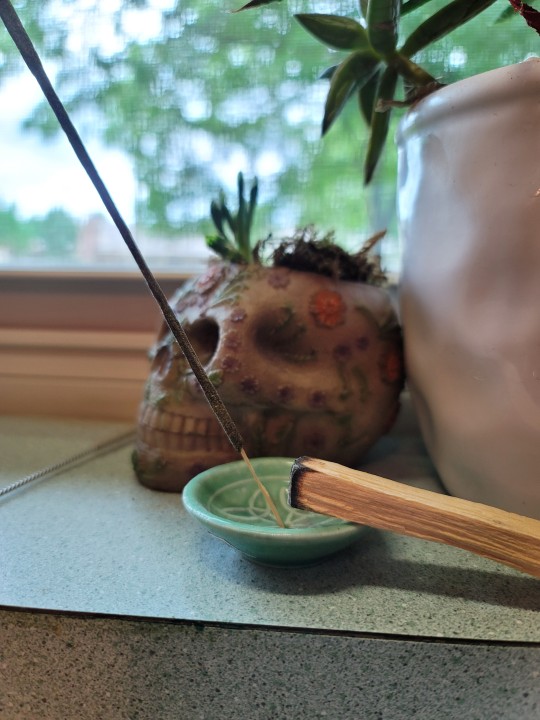
Sorry this is so long. Probably should have done a 2 parter.
"My darling girl, when are you going to realize that being normal is not necessarily a virtue? It rather denotes a lack of courage!" - Aunt Frances, Practical Magic
My whole life, as far back as I can remember, I’ve wanted to be artistic. I’ve wanted to create. I love beauty. I love artistry. I love creation. I love the artsy look: jewelry, tattoos, flowing clothing, and funky hair. It is a personal aesthetic I keep returning to, especially as I get older. As a child, I tried so many different forms of art—painting, photography, drawing— but none of them seemed quite right. None of them got what was in my head out. All of them fell short until I started writing. Writing was a flame, a fire, a drug. Writing allowed me to express what was in my imagination. This is the first thing to understand.
Everyone is artistic and art is everywhere. I’ve believed this as long as I can remember. There are amazing artistic feats in our world: books, movies, video games, paintings, sculptures, and magnificent pieces of music. Yes, art can be very high and very special. But, art can also be found in charcuterie boards, homemade quilts, sourdough bread, cocktails, soup, and all ordinary things if we but look and see. Art can be high magic and art can be ordinary. This is the second thing to understand.
As I’ve embraced being a homemaker, a HearthKeeper, a woman where she’s meant to be, I came across the term domestic artist. As much as I didn’t like the book Eve in Exile by Rebekah Merkle, it gave me this. It gave me the term domestic artist. That stuck with me. It spoke to me because it captured both the first and the second thing. It captured the never-ceasing call to create which haunts me at all times, and it elevated and honored the ordinary in a sprinkling of fairy dust. It said, “Yes, you have to cook today. Three meals plus snacks and drinks. It’s your job, but, but, what if, what if instead of looking at it as some drudgery, some Cinderella enslavement, what if you looked at it as an opportunity to create beauty?”
Not every meal, every outfit, every moment of your day can be a work of art. Some days you just have to do what you have to do. Some days get upended in the opening credits with a broken washer or a sleepless child. Some days plans change. Life changes. One minute life looks like this, and then the next it’s on to something completely different. But, the beauty of being a domestic artist is that you can create art in any of these moments and in any setting. You can find art in any moment and in any setting.
See, the world tells us that homemaking, HearthKeeping, is boring. It tells us it’s pointless. A waste. You could be changing the world. Only dumb useless women keep their homes. And that’s because they’re either tied down by a dictator of a husband or the demands of children or the cultural trappings of their religion. Courage, dear heart. Courage! Homemaking is magic. Homemaking is flexible. Homemaking changes with the seasons and the woman. I, I am a bit bohemian, a bit rustic, a mixture of rugged and romantic. I grew up a tomboy, but have embraced being a woman in her home since I was a child. I love leather and lace. I love cottage-witch aesthetics. I love boots and long flowing things. I like deer heads, linen, skulls, and ruffles. I like feathers and dreamcatchers, but I also love to decorate with open space. I love pies and feeding my husband. But, look at this, one of my best friends is a classic. She loves clean lines, traditional and timeless pieces. She loves modern accents. She loves beachy highlights and hammocks. She’s not into farmhouse, rustic modern, or raw-edged wood. On any given Sunday, she’s in a pencil skirt, simple top, simple heels with her three daughters in matching dresses while I’m in distressed boyfriend jeans, a mullet-tucked top, and wearing my crow skull. We’re very different, but we’re both homemakers who love making our homes.
I have a woman in my life who quilts and that flows out into their decorating. So many of her things are beautifully hand sewn. If she wants it, she makes it. Another friend grew up in Africa and her home is filled with her love of that culture. One dear friend loves plants and grows amazing flowers that she uses to create Instagram-worth bouquets. Another woman isn’t super fluffy-feminine but she has an eye for remodeling and so is constantly making improvements on her home: flooring, painting, and more. My sisters, like me, both enjoy a minimalist approach to decorating and all three of us have a special place for coffee. Both my sisters’ homes are welcoming and peaceful even with kids running around like crazy.
That’s the point, the world tells women to band together, that we’re a sisterhood, that we should go out and change the world, abandoning our homes before we’re relegated to only kitchen and nursery work, but reality tells me that the most amazing women I know are busy in their homes. This is sisterhood. This is where we bloom. It is here that we have flexibility. For over five years, I’ve struggled with chronic health issues. Homemaking lets me decide each day what I can do and how I’m going to do it. Homemaking lets you change what you do for each season of life. Lots of littles? Keep it simple. Empty nest? Explore. Somewhere in between? Keep growing. Lots of energy? So many things you can expand into if you just refuse to believe the lie that homemaking is beneath you. Don’t be normal. Don’t believe that homemaking is a waste of time. Don’t buy into the lie that you are somehow being less than everyone else when you raise your children, love your husband, and create beauty. Have the courage to be strange. We were made for this! It suits us. This is an environment women thrive in.
When I got over my grammar inhibitions and started writing, I felt like my soul came alive. I felt like I’d finally found what I’d been searching for since I came into this world. It doesn’t matter whether I’m writing an epic story or writing about HearthKeeping or just word doodling, writing, words, stories just flow from me. Wonderfully, homemaking is like that for me, too. I want to read books, I want to learn, I want to talk about it, I want to do it. It’s not perfect. I don’t always feel glorious, but I do feel ‘right’ when I’m doing this. I feel like I’m where I belong. I feel like this is a place I can both rest in and grow in. I feel safe when I’m having a fatigue flare up and I feel excited when I think about all that I can do.
A real-life example: Sundays are long hard days. They’re days that generally spike my fatigue and my husband is worn out. They’re both the best and hardest day of the week. When we get home I make a cocktail and we crash. Inevitably, the minute I sit down my man asks for a snack and what we’re having for dinner. For several years, this drove me up a wall. It is Sunday. The day of REST, why is it my responsibility to always make food? Epic sigh. Epic whiny sigh. I would meal plan for the whole week and then wing it on Sunday and Monday, always with poor results and grumpiness on my part. Then, one week as I meal-planned, I realized that I could also prepare for the weekend. Lightbulb. Facepalm. Really? Why had it taken me into my 40th year of life to realize that if I want a quiet, restful, happy weekend, I should just plan snacks, drinks, and meals ahead of time? I’m going to blame it on my chronic health, brain fog addled mind. I’m going to blame it on laziness. I’m going to blame it on being a young homemaker. Some are understandable, some are inexcusable.
Sundays now involve way less stress because I can immediately prepare snacks and know what we’re eating the minute we get home. No more attitude issue. No more stress. Easy and nice.
Did this change the world? Does this matter to anyone but myself? Did my husband even notice? Maybe not, but this is homemaking. This is HearthKeeping. It is my job and my calling. Even without notice or world-shattering consequences, I’m pleased with the outcome. More than pleased, I’m really happy about it. It brings me joy and delight to find a better way to take care of my family. It allows me to sprinkle my Sunday afternoon with just a little bit of artistry. I make drinks, snacks, dinner. I feed my family.
See, one of the lies that the feminists preach is that we’re wasted in our homes. And yet, the majority of the women I know who work outside the home aren’t doing glamorous jobs. They’re not travel bloggers or world-renowned chiefs or CEOs. They’re cosmetologists, retail workers, bank tellers, nurses, teachers, and such. Now, none of those are bad. Working outside the home isn’t bad. (I think each family has to decide what family looks like to them.) Please, please, don’t read that as degrading. I worked retail and I think retail is important. These are all God-honoring employment in which you can strive and serve. I’m not bashing any of those jobs. I have many many dear friends who work outside the home. What I am saying is that I think we as women need to ask ourselves if leaving our homes en masse was worth it. Has it given us all the joy, delight, and fulfillment the feminists promised us?
I’ve done both. I’ve been a co-owner of a business that I helped grow from nothing to something amazing. I’ve worked as an everyday retail worker. I write and am the main editor for a small neighborhood magazine. And I’m a HearthKeeper. I will tell you right now, no qualifications, that HearthKeeping is the most satisfying job I’ve ever had. It not only challenges me every day but it also works with me. The boundaries are what I set in place and so I grow as I can. The work never ends, yes, but it also never ends. There is always something else to explore.
I think being a homemaker is largely attitude. You can buck against what you do, and most women do. Just spend two minutes on Pinterest looking at doing laundry or dishes and the bitter hatred comes pouring out. Look at the complaints women make against their churches: we’re relegated to doing nursery work and kitchen duty. What if, just for a moment, we decided to be Domestic Artists? What if, for just a moment, we tried loving our jobs instead of complaining? What if we thought that dishes meant food and good times and healing of the souls around us? What if we saw laundry as a way to keep beauty and cleanliness around us? What if we saw it as our privilege and delight to take care of the food, children, clothing, cleaning, cooking, gardening, growing of the next generation, and the men of the world? What if we embraced the domestic arts and saw them as truly magnificent, glorious, unique arts? How many of us would be able to say with a straight face that working retail is more fulfilling than managing a small world? Is it more fulfilling to go work in an office than it is to orchestrate a place of welcome, rest, and renewal for your husband and yourself? It might be more visible, but is it truly more long-lasting?
I can say that it isn’t. I can say that I think being a homemaker is uniquely suited for women and that we should have the courage to go against the grain of our world and say no. No, I’m not going to give all of myself to work outside the home when the home is far more challenging and interesting. No, I’m not going to believe the lie that homemaking is oppression and boredom. I will find beauty in the ordinary and I will embrace art in the everyday. This is one of those amazing jobs where it is what you make it. It is what you pour into it. If you think it’s boring or demeaning you won’t get anything out of it. If you think it is challenging and rewarding, you will get the world out of it. You will grow yourself and those around you. Think about what a wonderful thing it would be if we made our homes our careers! If we women really took on the label Domestic Artist in our own individual ways.
#homemaking#hearthkeeper#housewife#prose#trad wives#traditional femininity#domestic artist#writing#artists on tumblr#art
27 notes
·
View notes
Text
Find Your Way Back Home- Ch 3
Riyo Chuchi x Commander Wolffe, Riyo Chuchi x Commander Fox
Rating: T |||| Word Count: 1.9k |||| Set Post Order 66 |||| AO3 Link
previous • next

Riyo gripped the kitchen countertop tighter than anything in her whole life. The loud pounding of her heartbeat in her ears threatened to drown out the pounding of her heart as she sought a tether point in her whirlwind of emotions.
She couldn’t do this.
How could she do this? The ghosts she’d left on Coruscant were now seeking shelter in her bedroom.
She’d looked at Wolffe laid out on her bed, and some sick part of her expected him to be Fox. She used to bandage her lover’s wounds on their bed in her old apartment. What had she done to deserve this cosmic taunt?
“Riyo?”
Riyo’s hands flew to her mouth to hold in her startled shriek at Ahsoka’s appearance just to her left. Her friend’s lips twisted into an apologetic smile, and she patiently waited for Riyo to come down from her sudden rush of adrenaline. Her rusty hand cupped Riyo’s elbow to help ground her.
“I’m so sorry,” Riyo murmured, blinking rapidly to hide her brimming tears before she met Ahsoka’s gaze.
The Togruta’s eyes were sad as she searched for the right words, despite them both knowing nothing would ease Riyo’s pain. “You see him.”
Riyo tried to laugh, but it came out as more of a gasp for air after so long underwater. “How can I not?” Her tears stubbornly refused to fall now, despite clamoring at the floodgates only moments ago. “I can’t… I can’t focus on this right now.”
“You can’t go back in there right now either,” Ahsoka calmly pointed out. “Wolffe needs to heal.”
And so grew her guilt. “I know.” She needed to do something to keep her hands and mind busy. “I’ll get some more juvan ready so I can make a cold pack and show Rex what to do. You’ll both need to know how for when you go back.” She tried to ignore the predatory way Ahsoka’s eyes followed her around the kitchen as she gathered supplies.
“I find that talking helps sometimes,” Ahsoka quietly suggested, once Riyo stood back at the sink with her items gathered around.
“I’m not sure I remember how to do that after so long on my own,” Riyo muttered, grabbing a bundle of leaves from a jar more harshly than they deserved.
“No time better than the present.”
Riyo paused to stare calculatingly at her friend. She wasn’t lying about not knowing if she’d be able to speak of her nightmares after so long bottling it all in. “I propose a trade.”
One of Ahsoka’s painted brows rose in interest. “A trade.”
“I will tell you if you update me on your… situation.” She’d tiptoed around the circumstances of her guests’ arrival– and unlikely survival– for the past few days.
“Alright, deal.”
Riyo’s hands hovered uncertainly as she tries to steady her breathing before she begins. Where to even start? She’d tried so hard to forget that night six months ago. Now she had to relive it in full.
“I… I was home for the night.” Riyo doesn’t even recognize her voice with how vacant it sounds. “Everything was normal, even when I got a call from Co– Thire.” She didn’t want to relegate them to their titles. Those men– her friends– were worth much more than that. “He’d call sometimes if Fox was too busy to come home.”
Breathe in, one, two, three, breathe out.
“There’s– there was a code phrase Fox had me agree to. Dusk is falling soon. If one of us used it in a communication, we knew it was from the other.” Her hands began to shake as she ground the juvan up. “Thire said it to me that night. He said I had to flee Coruscant while I still could, before I was marked as a traitor by the Chancellor. That Fox needed to know I was safe, because… because he didn’t think he was coming home.”
“Oh, Riyo…”
Riyo tried to laugh but she choked on her voice. “No, no it’s fine. Please don’t feel sorry for me, not after–”
Not after what you’ve lost. It hangs in the air like a shadow, chilling the two women to the bone.
She could feel Ahsoka’s eyes on her for a long moment before she conceded. “Alright. So you fled Coruscant?”
Riyo nodded. “Yes. I waited for him, but… then I gathered those I could and had a trusted pilot shuttle us off. It wasn’t just those from my office, though. There were several other members from Pantora’s allies that we also safely evacuated. It was beneficial in the long run, since the number of hyperspace jumps we needed to make ensured that we weren’t followed.”
“That was wise of you,” Ahsoka confirmed. “You most likely had been tailed. The Empire has been interrogating anyone they view even as having a potential to be rebellious.”
Riyo dipped her head in a gentle nod. “And I never was one of the Cha– Emperor’s greedy followers,” she added.
Her friend’s lips quirked up in a humorless smile. “No, you weren’t.”
“Anyways, I timed my resignation to autosend sometime during our flight, and I contacted Bail, who gave us directions to follow. That’s all there really is to tell,” Riyo sheepishly shrugged, relieved to be finished and able to turn her attention back to the juvan leaves she’d laid out. They needed to be diced and then ground with water into a paste that could be either frozen and saved, or wrapped in a damp cloth and held to the wound.
“So, my turn then?” Ahsoka asked, faux-cheer evident in her voice but appreciated.
Riyo nodded, thankful for something else to focus on. She beckoned her over though, waiting until the Togruta was looking over her shoulder. “Just make sure to watch how I do it, so you’ll be able to on your own. The leaves have to be separated carefully, or you’ll negate the medicinal qualities.”
Ahsoka observed quietly as Riyo worked, nodding along to each specific task that Riyo pointed out. It was quite simple, but an untrained eye would still mess it up. It was nice to have someone at her side. She’d been so used to being alone.
“We agreed on a trade?” Ahsoka prompted, once Riyo stepped aside and handed the knife over for her to try. “Would you still like to hear what we’ve seen?”
Riyo bit the inside of her cheek to try and keep herself afloat in the surge of stress that threatens to sweep her away. “Yes, please.”
Ahsoka nodded sharply, and then the knife made its first clean slice. “We were on our way back from Mandalore after apprehending Darth Maul– the Sith Zabrak,” she elaborated for Riyo’s sake. “And an order went out to all the clone troopers, everywhere in the galaxy: execute Order 66, to kill the Jedi.” Her fingers clenched around the knife handle to the point that Riyo thought it’d snap. “Somehow Rex… he fought it long enough to warn me to find a file about Fives, an ARC trooper that–”
Riyo could feel the blood drain from her face at the mention of that name, one she’d long forgotten. “I remember. Fox… he shot him, to protect the Emperor.” It felt like lifetimes ago.
In a twisted sense, it was. It’d been during Fox’s lifetime, when he still came home to her every night.
Ahsoka hummed in agreement. “Right. Well, Fives had told Rex that the clones all had control chips in their heads, and that a damaged chip had caused another trooper to shoot a Jedi. No one believed him.” Her shoulders drooped. “I was able to capture Rex and take the chip out of his head, and he was back to normal. I… I let Maul out of his cell though as a distraction, and he damaged the ship so it crashed into a moon. We lost the whole battalion,” she finished in a whisper, head bowed.
“Oh, Ahsoka,” Riyo gasped. She wasn’t sure how a hug would be received, so she placed a comforting hand on her friend’s shoulder. “I’m so sorry.”
Ahsoka’s eyes were teary when she looked up. “Thank you, but please don’t be for me. I took a risk, and it was Rex’s brothers that paid the consequences.” She shrugged half-heartedly. “I’m glad we found Wolffe. There have been other clones that escaped, but Wolffe was always one of his closest brothers.”
A small smile slipped onto her face unbidden. “I’m glad for the both of them as well. How did you find Com– Wolffe, though? You all barely made it here,” she pointed out.
The Togruta sighed. “You know Bail’s been coordinating a lot recently. We were sent out on a mission to try and contact a defector from the Empire. They’re a medic, and they’ve been treating several troopers sent to them for abnormal behavior. We arrived to get them out, and Wolffe was their latest patient, but they were being watched.” She stopped talking to peer at her work cautiously. “Is this correct?”
She stepped out of the way so Riyo could observe her work. “This is very good for anyone’s first try,” Riyo praised her. “Now we just need to grind it with some water to get a thick enough paste.”
Ahsoka waited for Riyo to set up the next step before continuing. “We had the freed men escort the medic onto our waiting ship, but we couldn’t take Wolffe back to base because of his chip. I followed their instructions to try and deactivate it, but we had to leave in a hurry. It took us a few days and several firefights before we lost them well enough to get here.”
“Had no idea you’d gotten that good with a blaster, either.”
Riyo bit back a shriek as Rex’s voice piped up from behind them. Good thing she’d been using the mortar and not a knife, otherwise she might’ve cut herself. At least he had the decency to send her an apologetic smile once she whirled around to face him.
“Gee thanks, Rex,” Ahsoka huffed, reaching out to playfully slap his chest. The two of them shared a grin, and Riyo decided to study the wooden floor beneath her feet until they snapped out of it. She wouldn’t dare disrupt their small moment of joy.
“I came out to let you know Wolffe is asleep again,” Rex finally explained his presence after he shook himself free of their little bubble. “We spoke some, but he tired quickly.”
That was good. He clearly was suffering from some form of head injury, so any amount of time Wolffe was able to be awake and coherent was a step in the right direction.
“Alright, that’s wonderful news. We should be able to apply this compress despite that.” Riyo picked up the bowl of ground javun and gestured at a clean cloth folded on the counter top. “Would you grab that and come with me? I’ll show you what to do, so you know how in the future.”
A quiet grief crept up her spine with each step she took back towards Wolffe’s room. He needed her help. She could pull herself together for him.
Riyo entered the room alone and took the seat beside Wolffe’s still form. Rex would be along in a minute.
Until then, she studied the still man’s face, finding and cataloguing each unique feature of him and hoping it wouldn’t come back to haunt her like before.
#find your way back home#commander wolffe x riyo chuchi#riyo chuchi#ahsoka tano#captain rex#post order 66#fanfiction#star wars#the clone wars#commander wolffe#snowwolf
34 notes
·
View notes
Text
Ok @racethewind10 and @featherpluckn svu polycule barbeque here we gooooooo
It's labor day. And Elliot and Liv have been working a lot and they both want to spend time with Kathy and the kids and Maureen is coming to spend the weekend with her boyfriend and Kathy tells Liv to invite Alex bc she knows how those two are together and she figures if Mo sees Liv and Alex together she won't notice how Kathy/Elliot/Liv are together. It's a faint hope
When Alex gets there, in like. Linen pants and an expensive blouse, she finds Liv in cut off jeans and a tank top playing football with the kids (Katie and Lizzie vs Dickie and Liv) and her hair is tied back in a ponytail and her necklaces are bouncing against her tanned skin and for a second Alex fully hates herself for being in love with a woman who's wearing jorts.
Kathy is sitting in a lawn chair with little Eli asleep on her lap.
Elliot is by the grill.
"Cabot! Now the party's started. Lemme get you beer"
"who are you and what have you done with Elliot Stabler"
He grins and as he walks by her on his way to the cooler he smacks her ass.
No one notices but Kathy, who rolls her eyes
"he's in a mood" she says. "Come sit in the shade with me"
So Alex - who is so pale she'll burn if she doesn't close the blinds on her office windows - sits next to Kathy, big straw hat on her head to protect her nose, and Elliot brings her a beer, kisses Kathy's forehead and ruffles Eli's hair while he's there
"they look happy" Alex says, while they're all watching Olivia playing with the kids.
"yeah she does" Elliot says.
Kathy and Alex know what he means. Liv has had a hard road. But there, in the sunshine, laughing, ponytail bouncing, she just looks. Happy.
The game breaks up about the time Mo and her boyfriend get there. They're making introductions when Liv comes up and takes the beer right out of Elliot's hand and takes a long drink.
Literally no one thinks this is weird except Mo's boyfriend.
Then again after everything she told him about her parents, he didn't expect her parents to be best friends with a lesbian couple either so he figures maybe he was just being judgmental
Kathy goes inside to get the rest of the fixings for the burgers and Alex volunteers to help bc she wants to be in the AC for a minute.
Kathy gives the baby to Olivia.
Maureen watches this. She has never seen them like this, Liv with the baby on her hip like he belongs there, standing by the grill, laughing with Elliot, the four of them so easy together, and it's freaking her out a little
Kathleen notices
"don't make it weird. It works for them."
Elliot takes the beer out of Liv's hand
"what works for them"
Kathy and Alex emerge from the house carrying lettuce and kraft singles and ketchup and mustard and tomatoes and whatever else and Alex is exasperatedly trying to explain to Kathy about cheese and their shoulders are brushing and
"Katie what the hell is-"
"don't make it weird"
Mo decides that discretion is the better part of valor
Meanwhile, at the grill
"you gonna flip those any time soon"
"do you want to do this?"
"well I mean yeah if you're offering"
"like you know how to grill a burger"
"I know you need to flip them"
"I'll flip them when I'm good and ready"
Kathy and Alex are setting things up on a picnic table and Kathy rolls her eyes at them
"are they like this at work?"
"honestly? They're worse. At work they're carrying guns"
"ok children" Kathy says. She steps up between them and settles a hand on each of their backs. "Are they close?"
"yeah, go ahead and get the kids to the table"
Liv and Kathy and Alex shuffle everybody to the table, make the younger kids wash their hands, pour drinks. Liv is still holding Eli. Elliot discreetly flips the burgers while she's not watching
They all cheer when he brings them to the table, and it's all easy laughter and hands reaching and Liv is holding the baby and Mo realizes Kathleen was right. This is working for them. They're happy.
Alex gets em going with some story about something stupid Elliot did and Mo's boyfriend is watching these three women tease him mercilessly and wondering how it's possible that he still looks smug
"was that more or less stupid than the time Cupid threw you through a plate glass window"
"I'm not the one who accidentally got stoned on mushrooms"
"hey I wasn't stoned I was really sick!!"
"I'm not the one who stabbed the captain with a pickle. I swear to God Liv I thought you'd lost it"
"they're kinda cute" Mo's boyfriend tells her in a whisper. She shoots him a murderous look and he wisely takes a drink instead
"so" Alex turns to him and he wishes she wouldn't bc God is she pretty and her top is low cut but she's got eyes like a shark "tell us a little bit about yourself"
And all four of them are looking at him now and he gulps bc it was bad enough when he'd thought he had to impress Maureen's parents, but now he's got the killer lesbians to worry about too
But they have a nice time. The sun goes down, everybody who can is drinking - Liv slips Lizzie a sip of her beer and Alex feels bad for Dickie so she does the same while giving him a lecture about underage drinking - and the kids are running over the grass and Elliot and Liv and Kathy and Alex and Maureen and her boyfriend linger at the table. Eli is now asleep on his dad. It's nice.
They send everybody off to bed and the grownups start to clean up. Boyfriend offers to help, but quickly realizes they don't need him, and he goes to find Mo.
They don't mean to. Kathy has put Eli down and the kids are all in bed, Maureen's boyfriend has been relegated to the sofa but he's in the bathroom when they linger by the door. They need to call a cab for Alex and Liv, but...
"it's late" Kathy says, and she tangles her fingers with Liv's and looks up at Elliot with that pretty little pout he can't say no to.
"you think you can be quiet?" He says to Alex.
"you wanna find out?"
They tiptoe up the stairs together.
They strip each other bare. There's no rhyme or reason to it; just hands and lips trailing against skin and there's a king size bed they all go tumbling into, but they're trying not to move too much and they're all a little drunk and a little tired and they just end up a tangle of limbs and gently exploring fingers, whispers turning into light snores
Maureen's boyfriend sneaks into her bedroom
"my dad is gonna kill you if he catches you"
"trust me, he's not gonna. He's busy"
"what do you-"
"they didn't leave, Mo"
She groans and buries her face in his chest
She's up with the sun, a little stressed, a little confused, and she goes into the kitchen where she finds Liv, wearing one of Elliot's shirts over her jorts, Eli on her hip, making coffee
"you want some" she asks, very gently
She looks soft, and sweet, and happy, so Maureen just says yes. She'll worry about the rest of it later.
18 notes
·
View notes
Text
Task 1: Concept Mind Maps
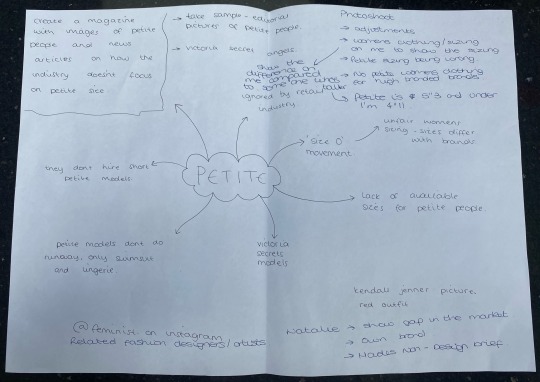
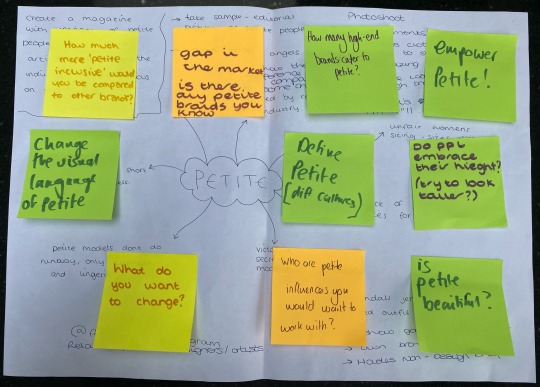
In pairs we produced a mind map of each others concept, for our final project, planning and considering how we can explore the following factors:
Research
Experimentation
Sampling
Development
Production
Personal Reflection/ Evaluation
Project/ Time Management
We was asked to write down our narrative on a piece of paper and swap with our partner so we had each others narrative. We then wrote down our ideas that came to mind related to their narrative, in order to help them with new ideas they may not have thought of or knew about. I really enjoyed this task as it helped me learn new facts about the petite world and I was able to complete lots of research. I always loved hearing about my peers narratives and their stories as to why they are focusing on a certain topic.
My completed research from this task:
Petite models -
After researching about types of work available for petite models I found out that other than Moss, most petite models do commercial and catalogue work. Models who work in fashion generally work with high street brands specialising in petite clothing. It is very rare for a petite model to find high-fashion work on the catwalk or for designer labels. This is something that I find unfair as your height should not matter. However, petite models are not restricted when finding work. This is due to an increase in brands catering for men and women with smaller frames and shorter legs, petite models are now employed to keep up with this fashion industry demand.
Successful petite models -
Models who have refused to obey the stereotypical image associated with top designers, catwalks and campaigns are creating a path for petite models. These inspiring successful models have completely ignored the height restriction demonstrating that a smaller stature is required in the fashion industry. “Successful petite models are making an impact in a tall girls stomping ground, ignoring the confinements set upon them.”
Twiggy -
A british icon in the sixties and only 5″4. She revolutionised the stereotypical look of the era, starting a new breed of supermodels. Her height is rarely mentioned due to her confident persona that demands attention. She is still the shortest model with such a supermodel status.






Beautiful dreams - Twiggy records her first single

Anja Konstantinova -
Russian-Australian model, her impressive range of work includes, Vogue, Marie Claire, Urban Outfitters and French Connection. At 5″4 her height is not an issue with each shot demanding attention with her striking features, blonde hairs and natural posing instincts. The successful model discovered in a melbourne hair salon has received lots of rejection in her career, but she continues to break boundaries in a predominantly tall industry.
She explains: “People in Australia don’t accept shorter girls because they are a bit harder to work with, you have to photograph them in a certain way.”




How to make the most of your petite frame -

Don’t draw attention to your shorter height when interacting with clients and via body language. You will have to work extra hard to get noticed, which means standing tall and learning to highlight your height in photos. Never be caught slouching and be sure to work on poses that lengthen your lines. Good posture and strong stature goes a long way when presenting yourself to an agency meeting and photoshoot.
Petite models who changed the fashion industry -
Lily-Rose Depp
Lily-Rose made her runway debut with chanel in 2016. She is just 5″3, but that did not stop her from becoming the muse of fashion icon Karl Lagerfeld.

Amina Blu
This German/ Pakistani beauty is 5″1 and no stranger to New York Fashion Week. Amina has walked for Kanye West more than 5 times. With her unforgettable looks and signature looks, Amina will keep making headlines.

The ‘Size 0′ movement
Sizes range from 0-2 which is extra small to 14-16 which is larger. Smaller sizes are usually petites, and larger sizes usually found in womens or plus size departments.
The size-zero ban is proof fashion industry on finally listening to customers. The use of size zero models has been a fashion industry scandal for many years. France’s top fashion house have committed to stop underage and size zero models from featuring in catwalk shows and advertising campaigns. Owners of brands such as Saint Laurent and Louis Vuitton say they want to persuade others in the industry to follow suit. The industry has long been accused of promoting unhealthy body images of women and ignoring well-documented health problems experienced by models. In 2017, the French government voted through a law requiring models must have a medical certificate confirming they were not dangerously underweight.
“No model under 16 years will be recruited to take part in fashion shows or photographic sessions representing adults.” Models between 16-18 years will no longer be allowed to work between 11pm and 6am and must be accompanied by a parent or chaperone if required to stay away from home.
“The wellbeing of our models is a fundamental subject” the statement from LVMH read.


Mallory Schlossberg - “I’m part of a huge demographic that retailers largely ignore - here’s why it’s so frustrating”
When reading this article I very much related myself to it, she mentions being reminded of her height near enough everyday, she is 4″11 like me. “There are only a few times when I'm reminded how short I am: when I'm riding the subway and someone pushes right into me because I'm not in his peripheral vision, when I can't reach my kitchen cabinets and hop onto the counter, and when I'm shopping.”
When she was in high school and college she frequently shopped in the kids section. She mentioned it being impressive to see the selection that’s available for wealthy, stylish kids these days. She is able to wear a lot of designer apparel that are much cheaper than adult prices as kids clothes takes less fabric to make. However, it comes to a point in an adult woman's life where you do not want to shop in kids section anymore, she wanted to wear apparel for women because she is a woman. Adult size small dresses zip up just fine, but they hug in all the wrong places and drag on the ground or are longer fit on her than they’re supposed to be.
“It's frustrating. How do you shop for clothes and not look like a child in children's clothing — or a child playing dress up in her mother's closet?”
There are retailers that do cater to petite women although the ranges are very limited.
“Walk into Ann Taylor, Loft (where I buy my jeans), J. Crew, Banana Republic, or a department store, and you'll see selections of petite clothing, often relegated to a small corner with an odd amalgam of apparel, as though the merchandise team is wondering, "who is this petite woman? Is she a mother? Is she frumpy? Is she a decaying 90-year-old? Is she youthful and feisty? Is she too young to show off her curves? Is she a virgin?" The answer — from a petite woman — is that she is none of the above, and she is all of the above. The petite woman is just like the regular-sized customer...only shorter.”
Retailers seem very confused with how to deal with short women. Topshop and Anthropologie are starting to recognise that short women like to look fashionable too, but the lack of options and concern for petite shoppers is noticeable. The reason as to why there are fewer petite options and not all stores offer apparel for smaller-framed women is because it requires a different design pattern.
As blogger TanyaTheAnonymousModel wrote on Jezebel:
"For a dress to look the same on a petite woman, a standard size woman and a plus woman — for the hem to hit at the same place on each woman's leg, for the waist to sit at the appropriate height, for the neckline to flatter but not overexpose, for the pockets to be useful, easily reached, and neither too small nor too big — requires, in effect, three totally different paper patterns, each with a separate, and expensive, development process."
The Fashion Institute of Technology in New York City offers a continuing education course in image consulting, combining petite and plus size bodies together as "special size" customers — noting that they make up about a tremendous amount of the population. The course description reads as follows:
"Over 70 million U.S. women fall into the special size category, that 50 % of the population is actually under 5'4", and 65 million women are considered plus size. Designers, patternmakers, retailers, stylists, and image consultants, and wardrobe technicians can all benefit from this in-depth workshop that demystifies the special size business potential. Learn the facts behind the figures with practical information for fulfilling the expectations of the special size customer with proper fit, fashion, and service. Highly recommended for anyone looking to increase sales and services. Interact with our two industry experts as they each tackle the dilemmas facing both the petite and plus-size customer and give concrete directions for satisfying their shopping needs and fashion passions."
An undergraduate course "sketching for fashion designers" mentions that "Large, half-size, petite, and junior-size figures are featured to study proportions used in the industry". Showing petites aren't entirely ignored in design school, they just aren't given equal attention. They're generally not on runways; runways are about aspiration, and who aspires to be 5'2''?
“Petite women have not been celebrated loudly as equals. They have not been given body-positive model icons to speak on their behalf, although we do have Kelly Ripa, Snooki, and Kim Kardashian in our corner. There has not been a call to action. There hasn't been any real vocal repugnance, but instead, there's been a silence and a void, which is too telling. Petite women have been pushed aside, not permitted to speak — much like the children for which many try not to be mistaken.”
17 notes
·
View notes
Text
All You Never Say - Part 4a
Mr Mikael and Mrs Esther Mikaelson and Dr Grayson and Mrs Miranda Pierce request the pleasure of your presence at the wedding of their children:
The Hon Elijah Edward Mikaelson and Dr Katherine Elena Pierce
On the twenty-third of June, twenty-twenty one, 1400h at Ely Cathedral followed by a reception at Mikaelson Manor, Ely Cambridgeshire
Dress: White Tie
23rd June 2021, Mikaelson Manor, Ely Cambridgeshire - 8:47am
“What do you mean the beagle ate the wedding cake?” Caroline hissed, shutting the door behind her so as not to alarm the bride on her big day.
“Well, I can detail the stages of destruction, but yes, the Mikaelson's beloved pet dog decided to taste test the cake early, long story short.” Caroline was certain that the housekeeper’s use of “the Mikaelson’s beloved pet dog” was clearly by design.
Caroline was all for adorable dogs, especially those that were photogenic for the wedding album like Tully, but not those who scoffed the cake before the ceremony had even begun. Especially given that extra amount of fondant and extra tier which cost the earth.
But given the way Tully looked at her with those imploring, brown eyes and the telling evidence of frosting smeared across her chops, she was close to calling it a day.
Who needed cake anyway? It was worth way too many calories and most people would be so drunk that far into the festivities it wouldn’t even matter, right?
“So, I see you’ve met our cute but pressing problem.”
Caroline turned to see the best man in all his glory. And by that she meant those unkempt curls, sly grin and a fitted, tank top that should be illegal given those arms on display.
Was this their thing? Just running into each other partially clothed. She looked down at her ensemble self-consciously glad for the shorts, t-shirt and the Maid of Honour monogrammed robe that she greedily pulled across her chest.
“Our problem?”
“Because a problem shared is a problem halved right, wedding buddy?”
“Wedding buddy? Oh, you mean the same guy who wanted to document the lost ring for speech fodder?”
“It was a joke but clearly you don’t know what that means, grouchy.”
“Oh, like that time you let your dog, albeit cute, eat the wedding cake before the ceremony. I only hope the Bride and Groom figurines are still firmly intact at least?”
“Well, their passing was most definitely mourned,” Klaus noted. Caroline was trying to be mad, but he was doing that thing where he looked cute so as to avoid her wrath. Bastard.
“So, what you’re telling me is that we have no cake or cake topper and the wedding is due to start in 5 hours?"
“I mean there’s some cake left, albeit a mess, but if the guests want to eat it off the floor...”
“Yeah, I can see the Prime Minister doing that. You are not helping, Mikaelson. Look, I’ll call the baker, they must have a back-up cake on hand, otherwise why are we paying them such an exorbitant amount? I mean it’s a cake, like it’s hard to bake one of those,” she rambled, the reality of the situation making a sudden and ugly appearance.
“Okay, I didn’t want to tell you this because you are clearly already upset but the baker has no wedding themed alternatives,” Klaus explained, shooing away both the guilty canine and her loyal housekeeper in the process, no doubt by design. This was not the news Caroline wanted to hear and clearly he knew it.
“What?"
“You are not going to lose it, not on my watch, Forbes.”
“I am not losing it,” she hissed, finally finding her voice. “But she is your dog and that makes you responsible for my mood.”
“She is a Mikaelson, I mean expensive taste comes with the territory,” Klaus replied. Caroline, meanwhile, felt the brief spell he had over her lift.
“Can you please stop offering up annoying commentary? We have an emergency, one that needs to be rectified STAT.”
“What I didn’t get to say was that the baker has two other cakes on hand.” Caroline’s ears pricked up, maybe all wasn’t lost.
“I’m listening,” she murmured.
Klaus pulled his cell from his pocket and swiped through his phone. “These are the options.”
He leaned in closer so she could see the photos but in the process his arm grazed hers and she was momentarily blindsided and not focused on the pressing emergency. It reminded her so much of two years ago, when she’d felt his arm encircle her waist and pull her towards him.
Caroline told herself he must have been dreaming at the time but that didn’t take away from how it had felt. It felt good, really good.
“Alright, love?” She looked up into his blue eyes, only deciding too late that it was a bad idea. A very bad idea.
“I’m just shocked by...” she paused, her eyes hurriedly flickering to his cell screen. “Congratulations on your Retirement, Bernie?”
“I’m sure we can change a few letters around or something,” she gave him a look which plainly said it wasn’t going to happen. “Right, here’s the other one."
“Happy 6th Birthday to our Unicorn Princess? Don’t think Kat would mind being called a unicorn princess at all but not sure about Elijah...”
“Well, what suggestions do you have, Forbes?”
He had a point, there were none that forthcoming but then it hit her.
“The bomboniere.” Caroline was surprised she thought of it given she was so caught off guard by his close proximity and the unfolding situation.
“The what?”
“I don’t have time to explain wedding terminology right now, I have a bride to reassure that everything is peachy. Just meet me in the kitchen in twenty minutes and put some clothes on while you’re at it.”
“Only if you do,” he smirked. Caroline didn’t wait before slamming the door in his smug face.
There were so many things to reconcile with Klaus Mikaleson and not just her feelings. Last night they’d shared more than a sandwich in the kitchen and two years ago...well that was another story.
Perch, Los Angeles CA - 14 February (two and a bit years earlier)
Caroline felt like she’d finally hit rock bottom.
Not because it was Valentine’s Day.
Or that she was single.
That wasn’t the worst part of her predicament. She was currently...well, before she could lament her situation a bell rang out, breaking Caroline from her regretful thoughts. She didn’t have time to bid Phil the Chiropractor farewell because a burly looking brunette appeared immediately in his place.
“Tyler.” Apparently there was no need for an actual greeting or for Caroline to ask his name in the first place. I suppose they only had two minutes so he was getting straight to the point. Caroline couldn’t blame him given how painful this whole thing was.
Caroline was going to kill them. First Bonnie, who wanted their apartment to herself tonight so she could cook a romantic dinner for current boyfriend Jeremy. Clearly he hadn’t been present at her most horrific of food failures given they were still dating.
They’d been living together since Bonnie relocated to Los Angeles nine months earlier and Caroline was enjoying rooming with her best friend again after so long. Then she got a boyfriend, even if he looked twelve, and Caroline was relegated back to her usual existence. It wasn’t like Caroline wanted or needed a boyfriend because her schedule was busy enough.
Which took her to the second person she had to blame. Lexi. Her colleague and friend, who decided they should spend the evening speed dating so Bonnie could “get it on with her boyfriend” as she put it. Caroline figured the fact she’d already signed them up weeks earlier and only asked right before a deposition hearing were the main reasons why she had no choice but to agree.
Now, here she was, pretending to be interested in Tyler and shooting deliberate looks in Lexi’s direction who seemed unaffected given the way she was attempting to read her guy’s palm. Smooth.
“I don’t think I got your name?”
“Huh?” She looked into his warm, brown eyes feeling guilty she’d been blatantly ignoring him.
“Your name?” Before she could reply, she heard a very familiar voice call out her name.
Then he appeared in all his gorgeous goodness, his ability to wear a suit had not waned since they’d seen each other last at a mutual friend’s engagement party. Why he was here of all places, she had no idea.
“Caroline, sweetheart.” Sweetheart?
“Do you know this guy?” Tyler asked, the confusion obvious. She didn’t blame him.
“Of course she knows me, I’m only her boyfriend.”
Her what now? Caroline was too shocked to speak let alone reprimand him for being a presumptuous idiot.
“You have a boyfriend? Then why are you here?”
“I’d like to know the same thing, mate,” Klaus agreed, his hands crossed over his chest. Caroline was madly trying to crawl under the table just so everyone would stop looking at her like she was some two-timing girlfriend.
Lexi meanwhile seemed to be enjoying the entertainment from afar, raising her champagne glass in salute, even if she had no idea what was happening. Caroline wasn’t enjoying it at all. She wanted to scream at him for being such an ass but at the same time a rescue from this situation was an equally enticing prospect.
“I…”
Before she could find the words, he found them for her.
“It’s my fault, sweet cheeks,” he implored, pushing past Tyler and placing his hands in hers. Caroline was trying to ignore the electricity it generated but also the horrible pet name he’d bestowed. Like he couldn’t have come up with something normal? “I neglected you and for that I am so sorry but just know that I will love you, always and forever.”
Was he kidding? Next thing he’d be pulling out a cracker jack bracelet or resembling any one of the romantic leads in a Nicholas Sparks adaptation. Caroline made a note to tease him about his taste in movies and television later.
However it seemed their audience didn’t mind one bit. Women and men nearby were more interested in fawning over the scene playing out than resuming speed dating. Even their organiser seemed transfixed.
She hated him, especially for interrupting her night and being the smug pain-in-the-ass she knew so well but she needed to get out of there fast and he was her ticket.
“Honey bear,” she cooed, noting the slight twitch in his jaw. Caroline knew he was trying to withhold his signature smirk. But why did he have to smell so good withholding it? His hands were still firmly intertwined with hers too. “You took me for granted, so why should I forgive you?”
Now he was trying to contain an eye roll, only someone who’d known him for that long could tell. And she was loving every moment especially if he was going to crash her speed date and embarrass her in the process.
“And for that I am eternally sorry, baby cakes.” Caroline had to really try not to dry reach. “But you are the one for me. We are destined to be together forever, like soulmates.”
As much as she wanted to draw this out and force him to eat those horrible and predictable platitudes, this show needed to end. Now. Given Tyler’s defeated expression she knew it wouldn’t be too difficult to transition to the bar and to a much-needed straight vodka on the rocks.
“You were an imbecile, Mario, but I’m willing to consider a reconciliation if you stop being an asshat and promise to worship me forever.”
Before she could relish in her response and the slight tugging at the edges of his crimson lips, he’d pulled her up and moved them towards the direction of the bar. No doubt because her demands were slightly out of the question and he was starting to feel embarrassed himself. Served him right really. Given half of the people were entranced by their conversation and the rest were clearly dubious she decided it was good timing to high tail it out of there.
“Worship you forever, someone clearly has tickets on themselves,” he muttered, gesturing to the barman. “And who is Mario? I so do not look like a Mario.”
“Says the man child named Mario who called me sweet cheeks and baby cakes."
“I was clearly being sarcastic,” he shot back, gesturing for a shot. “What was honey bear all about then?”
“You barrelled into my life uninvited, and last time I checked you don’t live here.”
“I'm in town for business and was having dinner with colleagues. Had I known it was going to be dinner and a show I might have arrived sooner.” Caroline chose not to respond immediately, just drank her vodka in one, long gulp. “Someone is thirsty.”
“I need to drink to deal with you.”
“Says the girl speed dating,” he whistled. “I mean you can be difficult and kind of abrasive, Forbes, but I never thought you’d speed date in a million years.”
“I am only doing this for Bonnie because she wanted the apartment to herself to cook for her date and then my friend Lexi signed me up without telling me,” she rambled.
“She’ll have another vodka,” he gestured to the barman. “So, I take it this boyfriend hasn’t sampled Bennett’s cooking yet? I just hope you left the fire extinguisher in plain view.”
“That’s what you took from all of this?’"
“I feel like if I delve too deeply I’ll be too immersed in all the Rebekah type drama and we both know that is not my thing.”
“I’ll be sure to pass on your best wishes to your sister,” she growled. “So, why involve yourself and embarrass me like that in front of total strangers? Let me guess, you’ve got no one to play with and were bored?”
“Don’t underestimate my ability to find a playmate, love.” The way he drawled “playmate” was making places below feel like they hadn’t in a long time. So much so that she didn’t even try to bite back. “Anyway, I thought it would be fun,” he teased, his left dimple making an unwanted appearance at that exact moment. “And I could tell you you needed rescuing.”
“I’m not some damsel in distress you need to save, Mikaelson,” she argued.
“Says the girl who looked like she’d rather be anywhere but here,” he shot back. “So, you’re welcome.”
“Kiss, kiss, kiss, kiss!” The patrons began to chant and tap their glasses, Caroline only just realising they seemed to have an audience of very interested speed daters watching their every move.
“I’m going to need more vodka,” she muttered, “But not here.”
Roosevelt Hotel, Beverly Hills - 2 hours later
“So, this is where you bring all your playmates?” It was the first thing that came to mind when Caroline spied the king size bed taking pride of place in his suite. They’d spent an hour at 25 degrees, the hotel’s poolside bar and were now in his suite.
Inexplicably.
Okay, maybe not so inexplicably.
Caroline wasn’t one to go to a guy’s hotel room - especially this particular one - but between the vodka buzz and the fact Lexi had picked up and Bonnie was enjoying her night in their apartment there wasn’t much choice about where to go.
The vodka had helped loosen her usual inhibitions and, although she’d never say it aloud, Caroline was enjoying his company. Although, if anyone asked about this temporary bout of insanity she’d blame the alcohol.
“ Says the woman who was questioning the existence of said playmates only a few hours earlier.”
“So, you won’t mind if I do this?” She stated, not bothering to ask his permission as she discarded her heels and jumped onto the perfectly made bed. He stopped what he was doing momentarily, his eyes transfixed on her short, black dress and bouncing, blonde waves.
“I’m going to have to tip the maid extra now,” his voice was low, husky almost.
“Maybe she deserves it,” Caroline shot back.
He didn’t respond immediately, just shrugged off his suit jacket and loosened his tie. She was watching him do it like it was in slow motion. Then he rolled up his shirt sleeves. Who knew forearms could be so...appealing?
Caroline was starting to think that she was entering some sort of alternate universe she needed to escape, if only just to keep her sanity and self respect. I mean he was Klaus Mikaelson and she wasn’t one of his “playmates.” Not by a long shot.
“Drink?”
“Water, please,” she replied immediately, he cocked an eyebrow as if to say she was no fun. “I’m a cheap drunk, what can I say? And who knows what else I might trash in this place under the influence?”
He seemed to accept her response, busying himself with drink preparation. “So, why exactly did you go speed dating in the first place?” He asked, filling a tall glass with ice cubes.
“I told you,” she panted, finally tiring of the activity and making herself comfortable on the expansive bed. “Bonnie…”
“I heard that version,” he pressed. “But I want the real one.”
He passed her the water and made himself comfortable on the bed, his aftershave combining with the dizziness and messing with her overall composure.
“It’s Valentine’s Day, and maybe you don’t understand, but spending it alone can kind of suck,” she confessed. “Especially when your roomie kicks you out of the house.”
“I just hope you kick Bennett out on Halloween as payback.”
“You like Halloween?”
“You have no idea, love,” he chuckled. “No rose petals or corny ballads, just blood, guts and general mayhem.”
“Noted.”
“It’s just this ridiculous Hallmark Holiday,” Klaus offered, stretching out further and grazing her legs in the process. “It creates unrealistic expectations.”
“So, it’s Hallmark’s fault?”
“Hallmark is the tip of the iceberg,” he explained. “Every candy company, every florist, every jeweller and don’t even get me started on those terrible things they call romantic comedies.”
“You don’t like romantic comedies?”
“I try to steer clear for my own sanity, Caroline.”
“Not tonight,” she murmured, an idea suddenly coming to mind. “If I’m forced to stay in this mediocre hotel with you then...”
It was a lie and they both knew it but suddenly the less tipsy version of herself felt like she needed an excuse to stay the night with her best friend’s brother in such close quarters.
“I demand a movie marathon.”
“Terminator, Rambo, Rocky?”
“It’s Valentine’s Day, Mikaelson,” she shot back. “And I happen to know there is a marathon on television tonight.”
“You’ve got to be kidding me?”
“I’m deathly serious,” she answered. “But before we start, I’m going to need some popcorn and a shirt.”
“You want my shirt?”
“Not the shirt you’re wearing, lover boy, don’t get so excited. But I can’t sleep in this dress.”
His eyes seemed to linger a little too long on her body and Caroline was trying to do everything in her power to remain calm. Luckily he broke the silence not too long after.
“I’ll get you a shirt, but I’m not going to enjoy these movies at all, understand? I am only watching these ridiculous excuses of cinema because you’ve taken my television hostage?”
2 hours later…
“So, the apparent “virgin who can’t drive” ends up with the step brother? I mean I’m not surprised given the poor and predictable plot but is this kind of union legal in the state of California?”
“For the fiftieth time, he’s not related,” she growled, throwing a few popcorn kernels in his direction. This is about Cher realising that material things in life aren’t everything.”
"Whatever you say, Forbes. Although, tell me after this movie ended she ditched the mansion, the jeep, the designer plaid and knee sock combination outfits and moved to the Valley?”
He was annoying but also eerily observant.
“Yes, I mean maybe? People with money can change.”
“They’ve clearly never met Mikael or Esther.”
He said it quietly but Caroline couldn’t mistake the pain in his voice. She knew about his difficult past but they’d never been close enough to discuss it and given they were lying in the same bed it didn’t seem like the best time to open that pandora’s box.
“Do I have a great choice for you next,” she promised, her eyes sparkling, hoping to lift the mood.
2 hours later…
“Are you crying?”
“No, for the last time I have allergies, Caroline.”
“Inside?”
“The pollen level was high today and the doors in these rooms are forever opening and closing. Maybe the maid doesn’t deserve such a big tip after all.”
Maybe it was cruel, but it was on television and there was no stopping the effects of the Notebook on even the most emotionless male.
2 hours later…
“I thought I’d seen everything,” he scoffed, stretching out tiredly. “She paid a guy to be her wedding date?”
“Not just anyone, he’s hot.”
“He’s an escort.”
“I think it adds to his overall appeal. He knows how to treat a woman because of his experience.”
“And how many escorts have you met?”
“Wouldn’t you like to know?”
“Wow, if you ever show up to a wedding with a stranger, I’ll be asking for their credentials,” he joked. “Wait, you think he’s attractive?”
“Didn’t I just say that?”
“Each to their own I suppose, but that aside, the whole premise is just unrealistic.”
“It is a movie.”
“Yeah, a romantic comedy,” he shot back. “Case closed. Now, can we please sleep already? I think I deserve it after that marathon effort.”
“Fine,” she conceded, leaning across to turn off the lamp. “I have to say your shirt is very comfortable.”
“It should be," he replied, snuggling into the covers. “That’s my lucky Ramones t-shirt.”
As her head hit the pillow, Caroline was wondering why he gave her that particular shirt to wear. She couldn’t deny just how good the worn fabric felt against her bare skin and how the faint hint of his aftershave consumed her senses.
Sleep was immediate.
When she woke up the next morning and felt his arm encircle her waist and pull her towards him Caroline relished in the feeling. She assumed life would go back to normal but for now she was happy to live in the moment. It was probably better that way.
Read on AO3 HERE
27 notes
·
View notes